Beginner's Course: A Subjective "Rock Anthology"
(1963-1976: The Classic Rock Era)Having reviewed more than 1200 records from the first - and best - two decades of rock music (not counting the Fifties, of course, which are also a great decade but aren't exactly subject to LP selection), I have decided to finally give in to the Ultimate Temptation, which is, to put up a static 'best-of' list.
This is, however, not so much a 'best-of' list, I think, as a brief 'course' whose aim is to outline rock's gradual development from 1963 to 1976 (since I'm no expert on Eighties and Nineties rock yet I'll leave that be for the moment; the list will include everything up to, but not including, the punk & New Wave era) and present a wholesome picture of its many stages, variations and styles as possible. If you just want to see my 'favourites' list, the best choice is to visit the General Ratings page and just lift the first hundred or so records off the list, starting from the beginning. This here album list will work on slightly different principles. The basic principle will be this: no two albums on the list should be too similar to each other (with maybe just a couple exceptions for records not rated any less than 15). For instance, Sergeant Pepper will definitely make the list, but not Magical Mystery Tour, because that album, unbelievably great as it is, was just a follow-up to Pepper that never represented any kind of true 'departure' for the Beatles. One Procol Harum album will definitely make the grade, but Procol Harum were such a stable and formulaic band that one is the absolute maximum for the list - even if that formula was one of art-rock's greatest achievements.
In this way, I hope that the list will be as full and - most important - as diverse as possible, a true eclecticist paradise. Of course, I have to put up the necessary disclaimer - I can't pretend to cover everything, and as I myself dig deeper into Sixties' and Seventies' culture, I'm bound to still be discovering new albums, bands and even entire styles that are hardly covered on the site. So the list is probably subject to future change and further additions (after all, why the hell should we revere these round numbers so much?). Reader comments with any additional ideas are also welcome, as long as you motivate your particular choices.
On the other hand, this list is supposed to have a real practical aim. Anybody who's not yet an expert on rock music but would like to grope in as many directions as possible to find out what suits him or her the best should buy all of these albums to see which styles are thrilling and which are boring. And if you're going to be eclectic and open minded, I insist that sooner or later you gotta have ALL of these albums in your collection, whatever your actual feeling towards them might be (even I myself don't really like all of this stuff). You'll hardly be able to like all of them, but you gotta have 'em anyway.
So here we go (links on here refer to my full reviews of the album, NOT to CDNow! Not yet, at least!).
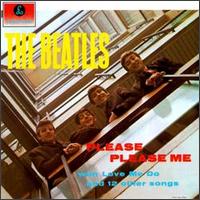 1.
The Beatles: Please Please Me (1963).
Okay, essentially it's no great shakes, but one has to know the
cornerstone from which we can easily count the birthdate of LP-oriented
rock and roll music. Besides, it's not true that the album has no more
entertainment value today - the songs hold up quite well on their own.
Basic, simplistic, exciting 'teen rock' of the early Sixties. Hey, perhaps
there hasn't actually been any true progress since then?
1.
The Beatles: Please Please Me (1963).
Okay, essentially it's no great shakes, but one has to know the
cornerstone from which we can easily count the birthdate of LP-oriented
rock and roll music. Besides, it's not true that the album has no more
entertainment value today - the songs hold up quite well on their own.
Basic, simplistic, exciting 'teen rock' of the early Sixties. Hey, perhaps
there hasn't actually been any true progress since then?
If you like this album you're well-advised to delve deeper in the often beautiful pop world of the early Sixties. Other early Beatles records are all even higher in quality (particularly A Hard Day's Night), and same goes for some of their worthy successors, most notably the Hollies. Plus, there are also minor bands like the Dave Clark Five, etc., which you should approach with caution because of a huge percentage of filler. Speaking of the States - the early Beach Boys are very recommendable.
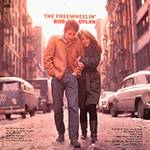 2.
Bob Dylan: The Freewheelin'
(1963). Not strictly a 'rock' album, but what is? The Bobster makes his
first Grandiose Move Of Humility and comes up with a record that's miles
above everything else the folkies were doing at the time, with a brilliant
sense of melody, a masterful use of the whiny, but so deeply humane voice,
and lyrics that... oh, those lyrics. Name me a singer-songwriter in rock
who wasn't in some way at least influenced by this stuff.
2.
Bob Dylan: The Freewheelin'
(1963). Not strictly a 'rock' album, but what is? The Bobster makes his
first Grandiose Move Of Humility and comes up with a record that's miles
above everything else the folkies were doing at the time, with a brilliant
sense of melody, a masterful use of the whiny, but so deeply humane voice,
and lyrics that... oh, those lyrics. Name me a singer-songwriter in rock
who wasn't in some way at least influenced by this stuff.
If you like this album you should certainly check out the rest of Dylan's acoustic albums (most notably Another Side Of Bob Dylan), and chances are that - unless you're one of those folkie purists that chastised Bob for going electric - you'll just fall in love with Bob and want to purchase everything he ever put out. Plus, this really opens the singer-songwriting route for you, from Simon & Garfunkel to Joni Mitchell. Welcome aboard.
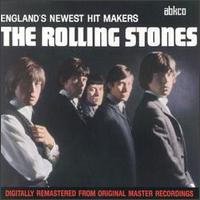 3.
The Rolling Stones: England's Newest
Hitmakers (1964). As in the case of Please Please Me, it is
a bit hard today to realize what the hell all the fuss was about; but just
as Please Please Me, this record holds incredibly well over time.
Simply put, this was the first - or the first well-known, at least - LP
to present rock'n'roll as a serious, venomous, aggressive force
to be feared and be reckoned with. Super-tight playing, teenage angst,
a strong whiff of sexuality and rebellion... all this and more, even if
it featured only one original composition. Goes to show that the Rolling
Stones embodied rock'n'roll from the very beginning.
3.
The Rolling Stones: England's Newest
Hitmakers (1964). As in the case of Please Please Me, it is
a bit hard today to realize what the hell all the fuss was about; but just
as Please Please Me, this record holds incredibly well over time.
Simply put, this was the first - or the first well-known, at least - LP
to present rock'n'roll as a serious, venomous, aggressive force
to be feared and be reckoned with. Super-tight playing, teenage angst,
a strong whiff of sexuality and rebellion... all this and more, even if
it featured only one original composition. Goes to show that the Rolling
Stones embodied rock'n'roll from the very beginning.
If you like this album you will definitely want to get all the other early albums by the Stones (particularly Now! and Out Of Our Heads), as well as those other early Sixties bands that preferred to follow in the Stones' 'dirty' footsteps rather than in the Beatles' 'clean' ones - among them, the Animals and the Pretty Things, or even the Kinks, inane as they were at that early period.
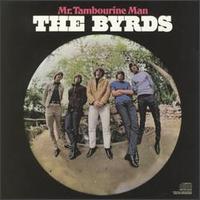 4.
The Byrds: Mr Tambourine Man (1965).
Not the easiest listen (some actually find it boring, imagine that), but
this is still one of the earliest and most successful marriages of pop/rock
music with folk influences and serious lyrics (granted, the only 'serious'
lyrics on here are those in the Dylan and traditional covers, but still...).
Add to this the Byrds' patented '12-string jangle', and you get one of
pop music's earliest attempts to cling onto a really serious and even spiritual
foundation.
4.
The Byrds: Mr Tambourine Man (1965).
Not the easiest listen (some actually find it boring, imagine that), but
this is still one of the earliest and most successful marriages of pop/rock
music with folk influences and serious lyrics (granted, the only 'serious'
lyrics on here are those in the Dylan and traditional covers, but still...).
Add to this the Byrds' patented '12-string jangle', and you get one of
pop music's earliest attempts to cling onto a really serious and even spiritual
foundation.
If you like this album check out their 'sequel' - Turn Turn Turn (a bit weaker, but essentially the same), and you might also want to sniff out other 'folk-rock' efforts from the early Sixties, the Searchers in particular, who actually employed the "jangle" some time before the Byrds, but weren't quite as effective with it. And, of course, this also paves the way to all kinds of 'intelligent roots rock', as I call it.
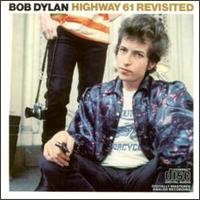 5.
Bob Dylan: Highway 61 Revisited
(1965). Finally - the ultimate linking of 'serious lyrics' (in this particular
case, Dylan's unique twist on beat poetry, drenched in counterculture references
and pure atmosphere) to rock and roll, garage rock, to be specific.
God knows how many bands and artists this album has influenced, but dammit,
this is just a fascinating listen in itself. One of the most vividly "expressive"
records of all time. Of course, it requires you to have enough tolerance
for Bob's whiny wheeze, but you CAN do it if you try...
5.
Bob Dylan: Highway 61 Revisited
(1965). Finally - the ultimate linking of 'serious lyrics' (in this particular
case, Dylan's unique twist on beat poetry, drenched in counterculture references
and pure atmosphere) to rock and roll, garage rock, to be specific.
God knows how many bands and artists this album has influenced, but dammit,
this is just a fascinating listen in itself. One of the most vividly "expressive"
records of all time. Of course, it requires you to have enough tolerance
for Bob's whiny wheeze, but you CAN do it if you try...
If you like this album check out its predecessor, Bringing It All Back Home, which I didn't include in this list simply because it's very similar to Highway, but somewhat rawer and more of a 'water-treading compromise', with one side completely acoustic (although it's beautiful anyway). And if you don't like this album, chances are you just weren't born for rock music.
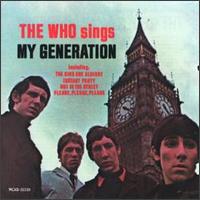 6.
The Who: The Who Sings My Generation
(1965). It's very tough to argue what was the first punk album ever, but
this is as close as it ever gets. The Who break new ground by showing the
possibility of loudness, agression and noise when tied together with great
garage (and not so garage) melodies, making for one of the most brutally
powerful and overwhelming records of its epoch. A few R'n'B duds do mar
this collection, but overall, the band hadn't been able to come up with
something as influential and convincing as this stuff until Tommy.
6.
The Who: The Who Sings My Generation
(1965). It's very tough to argue what was the first punk album ever, but
this is as close as it ever gets. The Who break new ground by showing the
possibility of loudness, agression and noise when tied together with great
garage (and not so garage) melodies, making for one of the most brutally
powerful and overwhelming records of its epoch. A few R'n'B duds do mar
this collection, but overall, the band hadn't been able to come up with
something as influential and convincing as this stuff until Tommy.
If you like this album you should probably invest more in garage rock and proto-punk (even if the proto-punk stuff actually came later). Unfortunately, the Who never experimented with this kind of sound in the studio any more, switching to psychedelia and artsiness (not a bad thing either), so if you only like 'aggressive' side of the Who, stick to their live records.
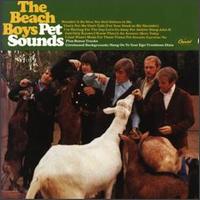 7.
The Beach Boys: Pet Sounds (1966). It
did make my 'top 10 overrated albums', of course, but it's still great.
The world's premier surf band comes up with a fully integrated, working,
smooth symphonic sound, setting the precedent for hundreds of bands to
come. It's a bit too 'self-consciously beautiful' for me to take it as
my ultimate guide to spirituality, but many people do take it as such,
and who am I to judge? Beauty abounds on here.
7.
The Beach Boys: Pet Sounds (1966). It
did make my 'top 10 overrated albums', of course, but it's still great.
The world's premier surf band comes up with a fully integrated, working,
smooth symphonic sound, setting the precedent for hundreds of bands to
come. It's a bit too 'self-consciously beautiful' for me to take it as
my ultimate guide to spirituality, but many people do take it as such,
and who am I to judge? Beauty abounds on here.
If you like this album you can try to check out other records by the Beach Boys, but you gotta remember, Pet Sounds isn't really all that typical for the band - it's more of a solo Brian Wilson revelation. Don't discriminate their post-66 stuff, either: you'll have to wade through fluff for sure, but there's a significant amount of pure beauty in their 1967-73 albums. On the other hand, liking Pet Sounds means the listener is open for further immersion into various kinds of art-rock, which is alright by me.
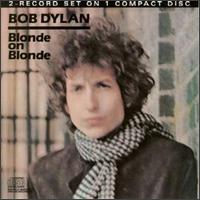 8.
Bob Dylan: Blonde On Blonde (1966).
A bit obnoxious of me, right? Nope. The amazing thing is that this album
sounds quite different from its predecessor, Highway 61. This is
hardly garage rock any more! This is Dylan's 'thin mercury sound', a wonderful
and epic canvas of economic, yet artsy arrangements tied in with even more
introspective (and incomprehensible!) lyrics. I just couldn't decide which
of the two albums to include and ended up including both. Now sue me...
8.
Bob Dylan: Blonde On Blonde (1966).
A bit obnoxious of me, right? Nope. The amazing thing is that this album
sounds quite different from its predecessor, Highway 61. This is
hardly garage rock any more! This is Dylan's 'thin mercury sound', a wonderful
and epic canvas of economic, yet artsy arrangements tied in with even more
introspective (and incomprehensible!) lyrics. I just couldn't decide which
of the two albums to include and ended up including both. Now sue me...
If you like this album you don't actually have that much to do, because you will never, never ever hear anything even remotely close to it. It's extremely difficult to establish the scientific formula of its uniqueness, but for some reason, this particular style just proved impossible to recreate by anybody, including Bob himself (not that he ever tried, to be fair). Essentially, there's not even any guarantee that it will open the road to later Dylan - later Dylan is great in his own way, but far less elaborate as far as arrangements and atmosphere go.
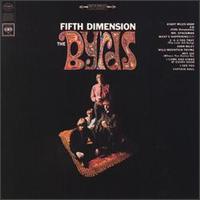 9.
The Byrds: Fifth Dimension (1966).
If Mr Tambourine Man didn't convince you of the Byrds' greatness,
perhaps this one will. Easily one of the most diverse albums produced by
an American artist, this one tackles everything from folkiness to the newly-appearing
psychedelia (pioneered by the Byrds as well) and sonic experimentation,
and it all works. It's almost an anomaly in the Byrds' catalog, as this
is the farthest they ever stepped away from their 'roots-rock' pattern,
but it's absolutely great.
9.
The Byrds: Fifth Dimension (1966).
If Mr Tambourine Man didn't convince you of the Byrds' greatness,
perhaps this one will. Easily one of the most diverse albums produced by
an American artist, this one tackles everything from folkiness to the newly-appearing
psychedelia (pioneered by the Byrds as well) and sonic experimentation,
and it all works. It's almost an anomaly in the Byrds' catalog, as this
is the farthest they ever stepped away from their 'roots-rock' pattern,
but it's absolutely great.
If you like this album check out its successor, Younger Than Yesterday, somewhat less innovative but even more consistent and well-written as far as melody is concerned. Plus, there's all the rich American psychedelic scene like the 13th Floor Elevators, of course (Psychedelic Sounds Of and Easter Everywhere are both quintessential), and lots and lots of exciting stuff on the Nuggets compilation.
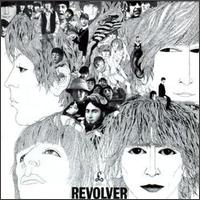 10.
The Beatles: Revolver (1966).
Much has been said about the Beatles merely improving on what the others
did before them - but what an improvement. Almost every song on here is
a timeless classic, pushing rock forward in countless directions: symphonic
('Eleanor Rigby'), psychedelic ('Tomorrow Never Knows'), jazz ('Got To
Get You Into My Life'), etc., etc. The lyrics are equally interesting throughout.
A rock collection that misses this album is like a Washington D.C. without
a Capitol.
10.
The Beatles: Revolver (1966).
Much has been said about the Beatles merely improving on what the others
did before them - but what an improvement. Almost every song on here is
a timeless classic, pushing rock forward in countless directions: symphonic
('Eleanor Rigby'), psychedelic ('Tomorrow Never Knows'), jazz ('Got To
Get You Into My Life'), etc., etc. The lyrics are equally interesting throughout.
A rock collection that misses this album is like a Washington D.C. without
a Capitol.
If you like this album be sure to check out its predecessor, Rubber Soul (1965), not included here exclusively because I consider it to be a tad weaker and sounding more or less in the same vein - although, granted, it might have been even more groundbreaking at the time of release. However, Revolver is, without doubt, the more 'serious' effort of the two, even despite (or maybe due to) the inclusion of one of the band's silliest songs ever.
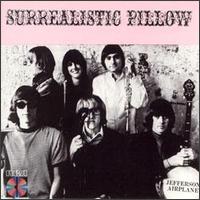 11.
Jefferson Airplane: Surrealistic Pillow
(1967). "Acid rock", much maligned as it was since its heyday,
is still a genre worth knowing. The Jefferson Airplane might have been
fairly inconsistent, a bane they shared with most other San Franciscan
bands, but here at least they offer us an excellent compromise between
the spooky acid fantasies and the accessible and catchy structure of a
pop song. Before you slam the Airplane together with those who seem 'to
know better', give this record a fair listen.
11.
Jefferson Airplane: Surrealistic Pillow
(1967). "Acid rock", much maligned as it was since its heyday,
is still a genre worth knowing. The Jefferson Airplane might have been
fairly inconsistent, a bane they shared with most other San Franciscan
bands, but here at least they offer us an excellent compromise between
the spooky acid fantasies and the accessible and catchy structure of a
pop song. Before you slam the Airplane together with those who seem 'to
know better', give this record a fair listen.
If you like this album there's no guarantee you'll be able to get further deep into acid rock a la Airplane or a la Grateful Dead, but you could try them - in the case of the Airplane, Crown Of Creation is particularly recommended. Plus, there are always more obscure ensembles like the Moby Grape or Quicksilver Messenger Service who have also produced their share of interesting music.
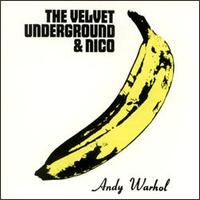 12.
The Velvet Underground: The Velvet Underground
& Nico (1967). The Holy Grail of Lester Bangs. It may have certainly
been overrated, but the beginnings of rock avantgarde do take place here
- the Velvets were one of the first bands to thoroughly neglect the typical
pop song structure and engage in all kinds of experimentation - some successful,
some definitely representing an 'acquired taste' - with feedback, noises,
dangerous lyrics and death imagery.
12.
The Velvet Underground: The Velvet Underground
& Nico (1967). The Holy Grail of Lester Bangs. It may have certainly
been overrated, but the beginnings of rock avantgarde do take place here
- the Velvets were one of the first bands to thoroughly neglect the typical
pop song structure and engage in all kinds of experimentation - some successful,
some definitely representing an 'acquired taste' - with feedback, noises,
dangerous lyrics and death imagery.
If you like this album you'll want to check out everything else by the Velvets - those who were more moved with the experimental and noisy side, stick to the even less compromise-offering White Light/White Heat, those who like the poppy and introspective side of the band more (like me), check out their later output (The Velvet Underground, Loaded).
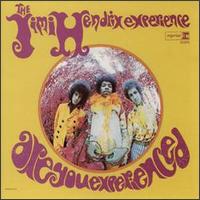 13.
Jimi Hendrix: Are You Experienced?
(1967). Well, I know it's trite to mention that, but the album did revolutionize
the use of the electric guitar, after all, like it or not. Classic Sixties
Hard Rock (with a large 'H') has its beginnings, if not its culmination
at the same time, here, and it also opened the way to wild, starry-eyed
sound effects experimentation, as opposed to the Beatles' moderate and
well-planned style. Plus, let's not forget how many excellent, unbeatable
songs we have on here.
13.
Jimi Hendrix: Are You Experienced?
(1967). Well, I know it's trite to mention that, but the album did revolutionize
the use of the electric guitar, after all, like it or not. Classic Sixties
Hard Rock (with a large 'H') has its beginnings, if not its culmination
at the same time, here, and it also opened the way to wild, starry-eyed
sound effects experimentation, as opposed to the Beatles' moderate and
well-planned style. Plus, let's not forget how many excellent, unbeatable
songs we have on here.
If you like this album feel free to get more Hendrix - if it's his poppy/psychedelic side that interests you more, Axis: Bold As Love is a must, if it's the technical and 'conceptual' side, scoop up Electric Ladyland, and, well, everything else. As for the 'Hendrix school', Robin Trower is probably the most worthy Hendrix disciple, although every hard rock guitarist is a Hendrix disciple in some way...
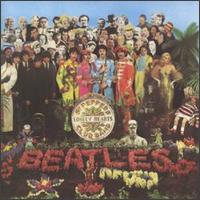 14.
The Beatles: Sgt Pepper's Lonely
Hearts Club Band (1967). Here it is. You may think it's overrated,
you may even think it's far from fitting the Beatles' highest standards,
but if you don't own this album, you're nothing but a snubby, anti-hyped
prick. After all, let us not forget, that this was the record that really
made all the 'snobs' believe in the potential of rock music as a Force
to be reckoned with. It's also chock-full with classic pop melodies, diverse,
and pseudo-conceptual. What else could you want?
14.
The Beatles: Sgt Pepper's Lonely
Hearts Club Band (1967). Here it is. You may think it's overrated,
you may even think it's far from fitting the Beatles' highest standards,
but if you don't own this album, you're nothing but a snubby, anti-hyped
prick. After all, let us not forget, that this was the record that really
made all the 'snobs' believe in the potential of rock music as a Force
to be reckoned with. It's also chock-full with classic pop melodies, diverse,
and pseudo-conceptual. What else could you want?
If you like this album (and you should, although nobody forces you to acknowledge this as the rock record to end all other rock records, of course), don't forget about its twin brother, Magical Mystery Tour, which is of the absolute same quality songswise and could have well been included in the list instead. Nothing else to recommend though - the Beatles are so darn unique it's frustrating.
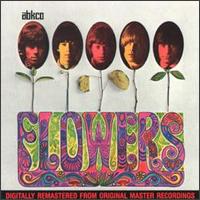 15.
The Rolling Stones: Flowers (1967).
A bit of a questionable judgement, but after all, this is the best
introduction to the Stones' classic 'pop period', and everybody needs to
hear those 'rootsy guys' have their go at Britpop to show they were masters
of any game. In fact, even if it's essentially a bastradized American
collection, it might just be the most perfect Britpop record ever made,
beating out the Kinks in terms of consistency and diversity. And you'll
spend weeks trying to get all those hooks out of your head.
15.
The Rolling Stones: Flowers (1967).
A bit of a questionable judgement, but after all, this is the best
introduction to the Stones' classic 'pop period', and everybody needs to
hear those 'rootsy guys' have their go at Britpop to show they were masters
of any game. In fact, even if it's essentially a bastradized American
collection, it might just be the most perfect Britpop record ever made,
beating out the Kinks in terms of consistency and diversity. And you'll
spend weeks trying to get all those hooks out of your head.
If you like this album rush out and grab all of the Stones' 1966-67 records (bar Their Satanic Majesties Request, which belongs in a different category), and don't forget to add a few Kinks albums of the same epoch on the way. I do know a few people who are only wishing to acknowledge this period of the Stones' history; they're wrong, of course, but doesn't that say something?
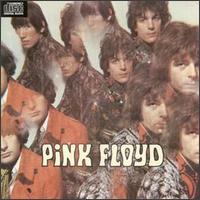 16.
Pink Floyd: The Piper At The Gates Of Dawn
(1967). The defining document of British 'astral psychedelia', all the
excesses, wildness and artistism of the infamous UFO club pressed into
one package. Can be offputting (I know it sometimes is for me, who would
like to have something more melodic from an era like that one), but sure
is revolutionary and totally mind-boggling. If you haven't heard 'Astronomy
Domine', the term 'space boogie' will never mean that much to you.
16.
Pink Floyd: The Piper At The Gates Of Dawn
(1967). The defining document of British 'astral psychedelia', all the
excesses, wildness and artistism of the infamous UFO club pressed into
one package. Can be offputting (I know it sometimes is for me, who would
like to have something more melodic from an era like that one), but sure
is revolutionary and totally mind-boggling. If you haven't heard 'Astronomy
Domine', the term 'space boogie' will never mean that much to you.
If you like this album you'll hardly find anything like it in the rest of Floyd's catalog, as this was Syd Barrett's only complete recording with the band (although you should at least try Saucerful Of Secrets), but you can check out Barrett's own solo albums if you're interested in the guy's psycho Ego. Otherwise, the closest to this album in style, I'd say, is the Stones' Satanic Majesties' Request.
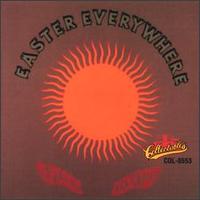 17.
The 13th Floor Elevators: Easter Everywhere
(1967). Another important psychedelic document, an album that merges hallucinogenic
experiences with Dylanish folk rock, garage, and the "electric jug".
Roky Erickson's influence on the avantgarde/alternative scene of the next
several decades may be overrated by some of those who like searching out
obscure albums and then trying to use them to beat the crap out of Sgt
Pepper, but it was still an influence, and besides, this is one truly
weird listen, even if you have to warm up to the monotonousness of the
sound a bit.
17.
The 13th Floor Elevators: Easter Everywhere
(1967). Another important psychedelic document, an album that merges hallucinogenic
experiences with Dylanish folk rock, garage, and the "electric jug".
Roky Erickson's influence on the avantgarde/alternative scene of the next
several decades may be overrated by some of those who like searching out
obscure albums and then trying to use them to beat the crap out of Sgt
Pepper, but it was still an influence, and besides, this is one truly
weird listen, even if you have to warm up to the monotonousness of the
sound a bit.
If you like this album be sure to check the band's debut, The Psychedelic Sounds Of, with shorter songs, a much stronger pop/garage presence, but apparently a much muddier sound (just try and disregard the pretentious, hilariously dated liner notes). Some real connoisseurs also swear by Roky Erickson's solo albums, the ones he made during temporary bouts of saneness in the early Eighties or something like that, but I've never heard them.
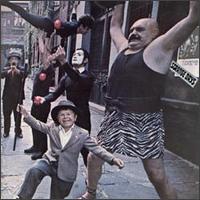 18.
The Doors: Strange Days (1967).
The band's debut self-titled album was perhaps more groundbreaking (as
it came first), but the two records came out in the same year and Strange
Days is clearly superior as far as songwriting is concerned. The Doors
throw everything in the melting pot - dark, creepy beat poetry, catchy
pop melodies, gloomy, 'gothic' arrangements, and come out with a winner.
One of the creepiest (yet catchiest) records ever released, and a real
shock for the 'flower power' days of American music.
18.
The Doors: Strange Days (1967).
The band's debut self-titled album was perhaps more groundbreaking (as
it came first), but the two records came out in the same year and Strange
Days is clearly superior as far as songwriting is concerned. The Doors
throw everything in the melting pot - dark, creepy beat poetry, catchy
pop melodies, gloomy, 'gothic' arrangements, and come out with a winner.
One of the creepiest (yet catchiest) records ever released, and a real
shock for the 'flower power' days of American music.
If you like this album the Doors are a must for you - all of their studio albums before Morrison's death have at worst some redeeming qualities and at best manage to nearly match Strange Days' level of sophistication, memorability and convincing force. Of course, there is a group of people who finds too much 'cheese' in the Doors, but I don't recommend anybody to stick to those.
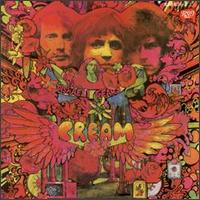 19.
Cream: Disraeli Gears (1967). Former
blues-rock's 'light psychedelia' answer to Pink Floyd's 'dark psychedelia'.
Not to mention the hard-rockin' ambitions of this album, a bit mild mayhaps
compared to Hendrix, but less 'whacky' and even more convincing to those
who prefer to be grounded in tradition. Contains some of the greatest psycho
anthems of its epoch - most notably 'Sunshine Of Your Love', of course,
but almost everything on here rules. A true classic of the genre.
19.
Cream: Disraeli Gears (1967). Former
blues-rock's 'light psychedelia' answer to Pink Floyd's 'dark psychedelia'.
Not to mention the hard-rockin' ambitions of this album, a bit mild mayhaps
compared to Hendrix, but less 'whacky' and even more convincing to those
who prefer to be grounded in tradition. Contains some of the greatest psycho
anthems of its epoch - most notably 'Sunshine Of Your Love', of course,
but almost everything on here rules. A true classic of the genre.
If you like this album check out more Cream in general, although liking the 'poppier' side of the band doesn't guarantee that you'll like their rougher, bluesier, more generic edge of Fresh Cream or Cream's hour-long live excesses. However, Cream's importance to the development of rock music can't really be underrated. And don't forget about Cream's 'inheritors' - Blind Faith and Mountain.
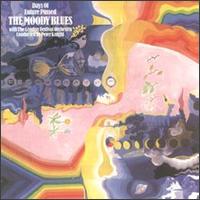 20.
The Moody Blues: Days Of Future Passed
(1967). This would have been rated as the Moodies' best album by me if
not the 'solo orchestra' parts that don't amount to anything specifically
good these days. However, the album was a mighty revolutionary blast, presenting
the first, if a wee bit seamy, attempt at crossing the pop/rock sound with
true symphonic arrangements, and what's equally important, the Moodies
were never able to put out a more consistent and spectacular set of numbers.
20.
The Moody Blues: Days Of Future Passed
(1967). This would have been rated as the Moodies' best album by me if
not the 'solo orchestra' parts that don't amount to anything specifically
good these days. However, the album was a mighty revolutionary blast, presenting
the first, if a wee bit seamy, attempt at crossing the pop/rock sound with
true symphonic arrangements, and what's equally important, the Moodies
were never able to put out a more consistent and spectacular set of numbers.
If you like this album you're certainly open to all kinds of symph-rock and pomp-rock, but, most specifically, you would easily fall for everything else the Moodies put out up to 1972 (the famous 'core seven'). Albums like To Our Children's Children's Children and A Question Of Balance are particularly recommendable, but really, the choice of your favourite is fully up to you.
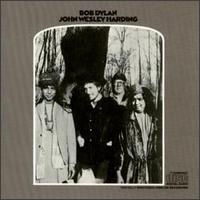 21.
Bob Dylan: John Wesley Harding (1967).
The last time Mr Zimmerman proved to be heavily influential, but oh what
a time. Dylan leads us into the realms of country-rock here, although country-rock
isn't a particularly great genre by itself, but you gotta remember this
is Dylan's take on country rock, which, for this album at least,
means that it's minimalistic, atmospheric, mystical and 'place-taking'.
Yeah, don't forget that this might be the first rock record ever written
that really carries you away to a not so distant past...
21.
Bob Dylan: John Wesley Harding (1967).
The last time Mr Zimmerman proved to be heavily influential, but oh what
a time. Dylan leads us into the realms of country-rock here, although country-rock
isn't a particularly great genre by itself, but you gotta remember this
is Dylan's take on country rock, which, for this album at least,
means that it's minimalistic, atmospheric, mystical and 'place-taking'.
Yeah, don't forget that this might be the first rock record ever written
that really carries you away to a not so distant past...
If you like this album don't forget to check the rest of Dylan's 'quiet' 1967-74 period, particularly New Morning and Nashville Skyline, even if these records are nowhere near as serious as Harding. And, of course, the album opens up the entire 'soft-rock' and 'singer-songwriting' stage for years to come. But it just towers around all that stuff as an untouchable monster.
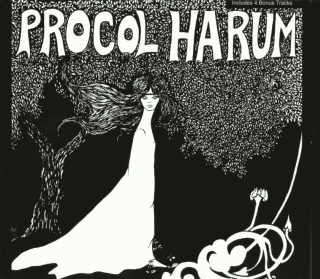 22.
Procol Harum: A Whiter Shade Of Pale
(1968). If the Moodies were the first to pioneer 'symph-pop' fusion by
interweaving their songs with orchestral arrangements, then Procol Harum
were the first to actually feature a symphonic approach within their
compositions. Add to this a startling new spiral of lyrical maturity courtesy
of Dylan disciple Keith Reid, immaculate technical perfection and cool
melodies, and you'll see why this record is so special. Together with Days,
one of the two major art-rock albums of that era.
22.
Procol Harum: A Whiter Shade Of Pale
(1968). If the Moodies were the first to pioneer 'symph-pop' fusion by
interweaving their songs with orchestral arrangements, then Procol Harum
were the first to actually feature a symphonic approach within their
compositions. Add to this a startling new spiral of lyrical maturity courtesy
of Dylan disciple Keith Reid, immaculate technical perfection and cool
melodies, and you'll see why this record is so special. Together with Days,
one of the two major art-rock albums of that era.
If you like this album check out the rest of Procol Harum's catalog - for my money, they never really topped this debut, but most fans would actually take 1969's A Salty Dog or 1971's Broken Barricades over it. Me, I just think that Procol Harum, while not venturing too much away from the formula, were one of art rock's most consistent outfits, so almost everything goes.
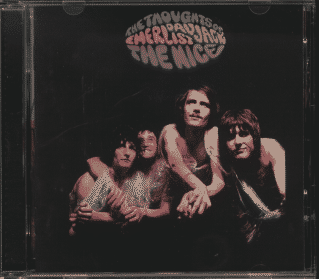 23.
The Nice: The Thoughts Of Emerlist Davjack
(1968). Criminally underrated. This is the record that really started Progressive
Rock, with lengthy, twisted compositions and lengthy, twisted, classically
influenced arrangements - but the best thing is, this all ties in with
the band members' acute pop sensibility, and the melodies are complex and
catchy at the same time. And for the record, this album sounds nothing
like classic ELP, even if Keith Emerson does do a large part of the job.
23.
The Nice: The Thoughts Of Emerlist Davjack
(1968). Criminally underrated. This is the record that really started Progressive
Rock, with lengthy, twisted compositions and lengthy, twisted, classically
influenced arrangements - but the best thing is, this all ties in with
the band members' acute pop sensibility, and the melodies are complex and
catchy at the same time. And for the record, this album sounds nothing
like classic ELP, even if Keith Emerson does do a large part of the job.
If you like this album I'm not in a hurry to recommend the Nice's subsequent output to you, as the band gradually went in the direction of making the music more complex and losing that masterful pop edge. However, no true fan of progressive rock should allow himself the unforgivable error of not hunting down such albums as Nice (1969) and Five Bridges (1970).
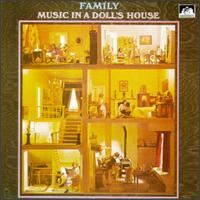 24.
Family: Music In A Doll's House (1968).
If anybody wanted to hear how roots-rock would work out when crossed with
a good dose of artsy ambition, this is one of the best choices. Blues,
jazz and folk crossed with an occasional symphonic approach, tremendous
diversity, multi-instrumentalism, a lead vocal that REALLY takes some time
getting used to, rock music was never like that. Great melodies, too -
at their best, these guys could be real aces at almost any genre existent.
24.
Family: Music In A Doll's House (1968).
If anybody wanted to hear how roots-rock would work out when crossed with
a good dose of artsy ambition, this is one of the best choices. Blues,
jazz and folk crossed with an occasional symphonic approach, tremendous
diversity, multi-instrumentalism, a lead vocal that REALLY takes some time
getting used to, rock music was never like that. Great melodies, too -
at their best, these guys could be real aces at almost any genre existent.
If you like this album feel free to dip into more Family - their output was always interesting, if not always consistent, and it's time somebody pulled this magnificent band out of the depths of oblivion. Family Entertainment (1969), in particular, is a followup worthy of every bit of respect. Another obvious choice to follow is Traffic, of course, a band similar in sound and far more well-known, but if you ask me, far less interesting.
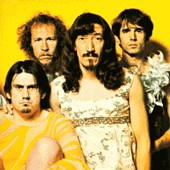 25.
Frank Zappa: We're Only In It For The
Money (1968). Of course, I'm recommending this to you not in
order to appreciate Frank Zappa's masterful bashing of the counter-culture
and hippies in particular, but particularly in order to appreciate the
vast and diverse sides of this weird genius. This is just about as perfect
of a fusion of rock/pop on one side, and avantgarde, neoclassical and just
pure weirdness, on the other, as possible. Almost everything to like about
Zappa is on here.
25.
Frank Zappa: We're Only In It For The
Money (1968). Of course, I'm recommending this to you not in
order to appreciate Frank Zappa's masterful bashing of the counter-culture
and hippies in particular, but particularly in order to appreciate the
vast and diverse sides of this weird genius. This is just about as perfect
of a fusion of rock/pop on one side, and avantgarde, neoclassical and just
pure weirdness, on the other, as possible. Almost everything to like about
Zappa is on here.
If you like this album you're free to revel in your newly-found Zappa obsession - which could last for years, considering the vastness of his catalog. Personally, out of the guy's Mothers of Invention period I would heavily recommend such albums as Freak Out (which I like even more, but it's a bit less diverse), Hot Rats, and Burnt Weeny Sandwich (Zappa's most serious exploration of modern classical).
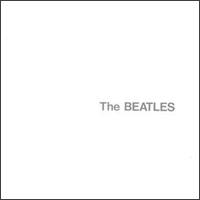 26.
The Beatles: The Beatles (1968).
Speaking of diversity - this is, quite possibly, the most diverse album
ever made. It wasn't all that influential (unless showing people how many
subjects you can tackle within one two-record set really counts), but if
ever you wanted to show somebody the entire package of successes achieved
within the Sixties - and earlier - there couldn't have been a better choice.
Not to mention that just about every single song on here rules mercilessly
in its own way.
26.
The Beatles: The Beatles (1968).
Speaking of diversity - this is, quite possibly, the most diverse album
ever made. It wasn't all that influential (unless showing people how many
subjects you can tackle within one two-record set really counts), but if
ever you wanted to show somebody the entire package of successes achieved
within the Sixties - and earlier - there couldn't have been a better choice.
Not to mention that just about every single song on here rules mercilessly
in its own way.
If you like this album what can I say? If you DON'T like this album you're a fuckin' idiot. (Now don't sue me, I'm just paraphrasing Mark Prindle on that one). No sane person can dislike this stuff. However, since this is the goddamn Beatles, there's no guarantee you'll like all these genres even if you manage to dig all the songs on here. Even I hold a grudge towards 'Revolution #9'... sniff.
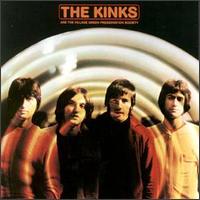 27.
The Kinks: The Village Green Preservation
Society (1968). The Kinks had been putting out masterful and unique
Britpop singles for several years by then, but this was their first absolutely
consistent LP, and although it sold miserably due to being incompatible
with the social values of its time, it has long since been recognized for
the humble Britpop masterpiece as it is. Here, rock music is put to the
service of puristic, conservative, peace-and-harmony matters, and it's
a total success.
27.
The Kinks: The Village Green Preservation
Society (1968). The Kinks had been putting out masterful and unique
Britpop singles for several years by then, but this was their first absolutely
consistent LP, and although it sold miserably due to being incompatible
with the social values of its time, it has long since been recognized for
the humble Britpop masterpiece as it is. Here, rock music is put to the
service of puristic, conservative, peace-and-harmony matters, and it's
a total success.
If you like this album don't forget to scoop up everything the Kinks recorded in 1966-67. Some actually consider their 1967 album, Something Else, to be of equal quality, if not superior, and while it might be a little more representative of Ray Davies' perspective, it's somewhat more boring in places - if you ask me, that is. But don't let that turn you off these guys. Britpop will never be the same without their input.
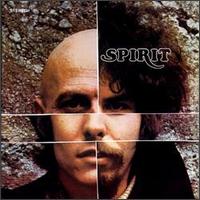 28.
Spirit: Spirit (1968). There is
a notion among snubby 'anti-hippie' rock fans that the entire California
scene was vastly unprofessional and actually did nothing but snort coke,
shoot up and fuck each other everyday. Spirit are one of those bands that
effectively cancel these notions. Professional, experimental, diverse and
emotionally resonant, the band created here a true masterpiece of late-Sixties
psychedelic rock, and it has no direct analogies on the US scene. Heck,
even Led Zeppelin ripped them off!
28.
Spirit: Spirit (1968). There is
a notion among snubby 'anti-hippie' rock fans that the entire California
scene was vastly unprofessional and actually did nothing but snort coke,
shoot up and fuck each other everyday. Spirit are one of those bands that
effectively cancel these notions. Professional, experimental, diverse and
emotionally resonant, the band created here a true masterpiece of late-Sixties
psychedelic rock, and it has no direct analogies on the US scene. Heck,
even Led Zeppelin ripped them off!
If you like this album dig deeper into Spirit, although I must warn you - contrary to rumours, I haven't yet found a Spirit album that would be better than their debut as far as songwriting and diversity goes. 12 Dreams Of Dr Sardonicus is often said to be their masterpiece, but I find it slightly boring in parts. Who knows, though, maybe you'll want to disagree.
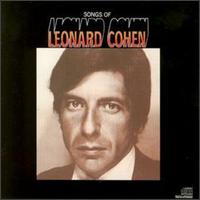 29.
Leonard Cohen: Songs Of Leonard Cohen
(1968). The ultimate in 'singer-songwriting'. Actually, I can't even call
Cohen a 'singer' or a 'songwriter' - he recites rather than sings, and
his melodies, while existent and sometimes resonant, are trivial in comparison
with Bob Dylan. But his sense of romance, as far as I know, has never been
topped; borrowing a little bit of influence from French poetry and French
bards (he's Canadian after all), he creates a near-masterpiece of love
and deeper feelings behind it.
29.
Leonard Cohen: Songs Of Leonard Cohen
(1968). The ultimate in 'singer-songwriting'. Actually, I can't even call
Cohen a 'singer' or a 'songwriter' - he recites rather than sings, and
his melodies, while existent and sometimes resonant, are trivial in comparison
with Bob Dylan. But his sense of romance, as far as I know, has never been
topped; borrowing a little bit of influence from French poetry and French
bards (he's Canadian after all), he creates a near-masterpiece of love
and deeper feelings behind it.
If you like this album you'll be glad to know that Cohen actually produced three more records in the same vein before switching gear and going more mainstream. They aren't any better and therefore aren't included on the list, but they're all a must-find for any Cohen fan. There are also probably boatloads of similar S.-S. guys floating around, but I wouldn't know about that.
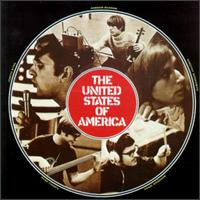 30.
The United States Of America: The United
States Of America (1968). A unique album well worth getting to know.
Marks one of the earliest uses of electronic instruments in rock, but its
main charm lies in how nimbly and engagingly band leader Joe Byrd applies
the lessons of neo-classical and avantgarde music to traditional pop structures,
making an album that is at once revolutionary and avantgarde and
totally accessible, at least, if you've had a wee bit prior experience
with psychedelic music. Its blatant intellectuality and "project"-like
status have prevented it from gaining popularity in rock circles, but it
does remain a cherished cult favourite for many years now, and rightly
so.
30.
The United States Of America: The United
States Of America (1968). A unique album well worth getting to know.
Marks one of the earliest uses of electronic instruments in rock, but its
main charm lies in how nimbly and engagingly band leader Joe Byrd applies
the lessons of neo-classical and avantgarde music to traditional pop structures,
making an album that is at once revolutionary and avantgarde and
totally accessible, at least, if you've had a wee bit prior experience
with psychedelic music. Its blatant intellectuality and "project"-like
status have prevented it from gaining popularity in rock circles, but it
does remain a cherished cult favourite for many years now, and rightly
so.
If you like this album I'm glad for you, because there's nothing else to recommend from this one-day "band". Joe Byrd seems to have released one more similar album with a band called "Joe Byrd & The Field Hippies", but nobody ever saw it. At least, no one I know.
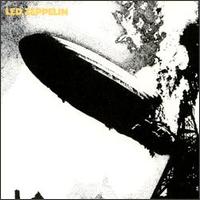 31.
Led Zeppelin: Led Zeppelin (1969).
The Zepsters introduce heavy metal in our lives - amping up the blues in
a way that nobody ever did before them. More than that, the band's debut
album displays them in such full flight as they would have serious trouble
demonstrating again on further records. This album isn't exactly as hit-heavy
as some of the following ones, but it is almost overwhelmingly consistent,
and the band's 'freshness' and restrictions are, for once, a good
thing. Robbie Plant never sounded better.
31.
Led Zeppelin: Led Zeppelin (1969).
The Zepsters introduce heavy metal in our lives - amping up the blues in
a way that nobody ever did before them. More than that, the band's debut
album displays them in such full flight as they would have serious trouble
demonstrating again on further records. This album isn't exactly as hit-heavy
as some of the following ones, but it is almost overwhelmingly consistent,
and the band's 'freshness' and restrictions are, for once, a good
thing. Robbie Plant never sounded better.
If you like this album you'll probably love all of Zeppelin's output, and they do have plenty of more good stuff where that one came from. However, before you start following the obvious route, I'd ask you to pay homage to Zep's predecessor, Jeff Beck, whose Truth album is hardly any worse - and it actually came earlier than Zeppelin's debut. Not that anybody cares, of course.
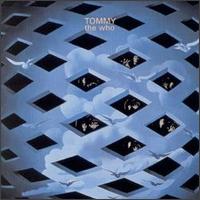 32.
The Who: Tommy (1969). Perhaps this
wasn't the first rock opera (the Pretty Things did beat them to it with
S.F.Sorrow), perhaps the storyline sucks and doesn't make sense
- all that's necessary to know is that a) it's the first and best case
of a former R'n'B band messing around with pompous, overblown 'artsiness'
and emerging victorious and b) it features tons of excellent rock melodies.
And it was a great advance for rock music, no matter what some of
the critics might think.
32.
The Who: Tommy (1969). Perhaps this
wasn't the first rock opera (the Pretty Things did beat them to it with
S.F.Sorrow), perhaps the storyline sucks and doesn't make sense
- all that's necessary to know is that a) it's the first and best case
of a former R'n'B band messing around with pompous, overblown 'artsiness'
and emerging victorious and b) it features tons of excellent rock melodies.
And it was a great advance for rock music, no matter what some of
the critics might think.
If you like this album this means you're ready to take in more Serious Art outcoming from Mr Pete "Big Nose... er, sorry, Birdman" Townshend and his trusty companions. Also, while we're at it, don't really forget to check out the above-mentioned S.F.Sorrow. It's somewhat patchy, but the psychedelic side of the Pretty Things actually deserves as much attention as their earlier rock side.
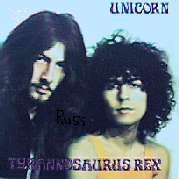 33.
Tyrannosaurus Rex: Unicorn (1969).
The British scene at the time was ripe with starry-eyed fantasy ravers,
most of them coming from the same UFO whereabouts where Pink Floyd started,
but Tyrannosaurus Rex were arguably the most unique, idiosyncratic and
inimitable of the lot. Marc Bolan supposedly sings like a real elf
and composes songs that take equal influence from the blues as well as
Celtic ballads and nursery rhymes. A lost gem that is well worth getting
to know.
33.
Tyrannosaurus Rex: Unicorn (1969).
The British scene at the time was ripe with starry-eyed fantasy ravers,
most of them coming from the same UFO whereabouts where Pink Floyd started,
but Tyrannosaurus Rex were arguably the most unique, idiosyncratic and
inimitable of the lot. Marc Bolan supposedly sings like a real elf
and composes songs that take equal influence from the blues as well as
Celtic ballads and nursery rhymes. A lost gem that is well worth getting
to know.
If you like this album then Tyrannosaurus Rex has more for you - Bolan recorded three acoustic albums, including this one, before recording two more electric ones of similar quality before shortening to T. Rex and going glam, which is a somewhat different story. Also, I'm not a big expert on the 'starry-eyed' scene, but perhaps you can check out Pentangle.
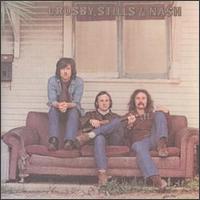 34.
Crosby, Stills, & Nash: Crosby, Stills
& Nash (1969). The beginnings of soft-rock? Even if you despise
the genre, this record can't be beat on sole account of melodies and harmonies.
Three revered and respectable gentlemen get together to form the ultimate
hippie conglomerate... hippie? Forget 'hippie', this stuff has far outlived
the hippie era and is still as biting, fresh and intriguing as it was thirty
years ago. And, of course, it did serve as a source of inspiration
for lots of soft-rock. Is this really a bad thing?
34.
Crosby, Stills, & Nash: Crosby, Stills
& Nash (1969). The beginnings of soft-rock? Even if you despise
the genre, this record can't be beat on sole account of melodies and harmonies.
Three revered and respectable gentlemen get together to form the ultimate
hippie conglomerate... hippie? Forget 'hippie', this stuff has far outlived
the hippie era and is still as biting, fresh and intriguing as it was thirty
years ago. And, of course, it did serve as a source of inspiration
for lots of soft-rock. Is this really a bad thing?
If you like this album you're a sissie... nah, forget it. If you like this album, you gotta prepare for a HUGE collection of Crosby, Stills, Nash, Young, Crosby / Stills / Nash, Crosby/Stills/Nash/Young, Crosby-Nash, Stills-Young, etc. records to come. There's been at least fifty thousand of them, and they all rule. Eh... well, not too sure about that last point.
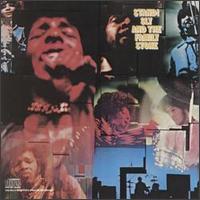 35.
Sly & The Family Stone: Stand!
(1969). Possibly the most notorious crossing of funk, R&B, pop, psychedelia,
and the peace-loving Sixties spirit ever recorded during the whole decade.
Marred by some excessive jamming, this is nevertheless a titanic effort
of a record, being just as innovative and technically superb in the purely
musical sense as it is exciting and engaging in the emotional department
(which is generally a rarity for "hippie music"). And 'I Wanna
Take You Higher' just might be the one song to capture the entire
atmosphere of the times better than anything else.
35.
Sly & The Family Stone: Stand!
(1969). Possibly the most notorious crossing of funk, R&B, pop, psychedelia,
and the peace-loving Sixties spirit ever recorded during the whole decade.
Marred by some excessive jamming, this is nevertheless a titanic effort
of a record, being just as innovative and technically superb in the purely
musical sense as it is exciting and engaging in the emotional department
(which is generally a rarity for "hippie music"). And 'I Wanna
Take You Higher' just might be the one song to capture the entire
atmosphere of the times better than anything else.
If you like this album Sly has more for you! Starting from their next album, the band undergoes some drastic changes, but the earlier albums are just as optimistic and ravenous, even if inconsistent; Life (1968), however, is practically as good as Stand! - not as grandiose, but with shorter and more diverse tunes, ranging from proto-Funkadelic acid dizziness to even proto-disco. Again, Sly & The Family Stone are a band whose two most successful albums have overshadowed the rest of their catalog for strictly non-musical reasons; today, there is no point in sticking to nothing but the "classics" and overlooking the rest of the good stuff.
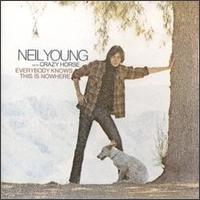 36.
Neil Young: Everybody Knows This Is
Nowhere (1969). I'm not the biggest Neil Young fan in the world, as
you may already know, and I don't even consider this his best album, but
I recommend it for one simple reason: the amazing duo of 'Down By The River'
and 'Cowgirl In The Sand', introducing a new way of guitar jamming that
fucks "technicality" and places the emphasis on emotional minimalism.
This just might be Neil Young's greatest achievement, and a reinterpretation
of the electric guitar function that should be considered in almost the
same league as Jimi Hendrix's musical revolution. And while he may have
rocked with much more energy and distortion on later albums (particularly
during his "comeback" period), nothing really beats these early
minimalistic wails of energy and inspiration.
36.
Neil Young: Everybody Knows This Is
Nowhere (1969). I'm not the biggest Neil Young fan in the world, as
you may already know, and I don't even consider this his best album, but
I recommend it for one simple reason: the amazing duo of 'Down By The River'
and 'Cowgirl In The Sand', introducing a new way of guitar jamming that
fucks "technicality" and places the emphasis on emotional minimalism.
This just might be Neil Young's greatest achievement, and a reinterpretation
of the electric guitar function that should be considered in almost the
same league as Jimi Hendrix's musical revolution. And while he may have
rocked with much more energy and distortion on later albums (particularly
during his "comeback" period), nothing really beats these early
minimalistic wails of energy and inspiration.
If you like this album, and for the exact reason I've mentioned, you will probably be disappointed - Neil's studio records in the Seventies almost never recapture anything similar, with rare exceptions like on Zuma's 'Cortez The Killer'. But do check out Rust Never Sleeps (1979) and pretty much every electric-based album of Neil's "comeback" period (1989 to 1994 in particular), some of which are actually more consistent than Everybody Knows.
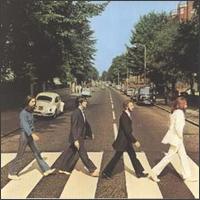 37.
The Beatles: Abbey Road (1969).
A questionable choice, as Abbey Road hardly really adds anything
to the Beatles' legacy in terms of innovation or influence. Granted, the
Beatles did have some nice synthesizer touches on here to promote the instrument
(merely for sound effects), and the lengthy multi-part suite on Side 2
has been quoted as an influence on certain prog-rock records, but essentially,
this can't help but be placed here exclusively because it's the most perfect
rock record ever made by mortal men.
37.
The Beatles: Abbey Road (1969).
A questionable choice, as Abbey Road hardly really adds anything
to the Beatles' legacy in terms of innovation or influence. Granted, the
Beatles did have some nice synthesizer touches on here to promote the instrument
(merely for sound effects), and the lengthy multi-part suite on Side 2
has been quoted as an influence on certain prog-rock records, but essentially,
this can't help but be placed here exclusively because it's the most perfect
rock record ever made by mortal men.
If you like this album don't forget to thoroughly check out all of the Beatles' late period - such monster albums as Abbey Road and The Beatles often tend to overshadow the Fab Four's equally creative singles of the day (collected on Past Masters Vol. 2), as well as the much-maligned Let It Be (even at their 'weakest', they were still going strong) and even the rip-offey Yellow Submarine soundtrack.
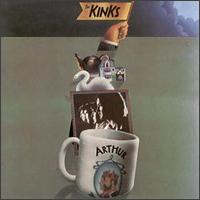 38.
The Kinks: Arthur (1969). The Kinks
suddenly leave behind the quiet folk-influenced Britpop and return to rock
territory - creating not only one of the catchiest (and at the same time
complex) bunches of tunes of its era, but also one of the greatest 'human
rights' albums of all time, with a strong, consistent anti-war image and
apology of the middle class. And if that's not enough, let us just remind
ourselves how much some of these tunes influenced all the punk and New
Wave scene years later...
38.
The Kinks: Arthur (1969). The Kinks
suddenly leave behind the quiet folk-influenced Britpop and return to rock
territory - creating not only one of the catchiest (and at the same time
complex) bunches of tunes of its era, but also one of the greatest 'human
rights' albums of all time, with a strong, consistent anti-war image and
apology of the middle class. And if that's not enough, let us just remind
ourselves how much some of these tunes influenced all the punk and New
Wave scene years later...
If you like this album, then you'll probably like the one after it - Lola And Powerman, although the Kinks never really recaptured the heights of Arthur again. In fact, I'm pretty scared to recommend later day Kinks albums (bar one); good as some of them are, it's a real crying shame when you look at them and see how low the mighty have fallen. Well, then again, so has the British Empire itself.
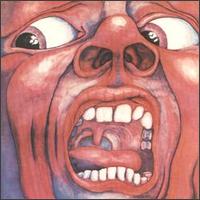 39.
King Crimson: In The Court Of The Crimson
King (1969). The Nice might have invented prog-rock, but King Crimson
transformed prog-rock into what we actually know the genre for: lengthy
compositions with extended solo sections, bloated lyrics, complex time
signatures, superb musicianship from all the band members, endless experimentation,
self-indulgence and rock theater. All of these things can suck (say, on
a Kansas record), but on here for the most part they work in a superb way.
39.
King Crimson: In The Court Of The Crimson
King (1969). The Nice might have invented prog-rock, but King Crimson
transformed prog-rock into what we actually know the genre for: lengthy
compositions with extended solo sections, bloated lyrics, complex time
signatures, superb musicianship from all the band members, endless experimentation,
self-indulgence and rock theater. All of these things can suck (say, on
a Kansas record), but on here for the most part they work in a superb way.
If you like this album, you're ready for Prog Rock prime time! King Crimson themselves only made one more album in the same style (too much in the same style, some say), but other bands took up the baton and proceeded to run forward, developing the genre to its absolute culmination in the early Seventies. Too much to recommend in one go, and it's hardly likely you'll like all of it, but try anything from early Emerson, Lake & Palmer, Genesis, or Yes in the first place.
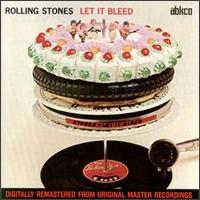 40.
The Rolling Stones: Let It Bleed (1969).
Roots rock was never like this before! The Stones mostly (but not completely)
get off Britpop and psychedelia and record an album that not only displays
a full understanding of the values of blues, country, and basic rock'n'roll,
but spices it with the Stones' irresistible wit, humour, clever arrangements
and, above all, a dangerous, menacing edge, and create the ultimate roots-rock
album whose quality has never been matched by any band since then.
40.
The Rolling Stones: Let It Bleed (1969).
Roots rock was never like this before! The Stones mostly (but not completely)
get off Britpop and psychedelia and record an album that not only displays
a full understanding of the values of blues, country, and basic rock'n'roll,
but spices it with the Stones' irresistible wit, humour, clever arrangements
and, above all, a dangerous, menacing edge, and create the ultimate roots-rock
album whose quality has never been matched by any band since then.
If you like this album the Stones' 'classic' period of 1968-72 lies open for you (start with 1968's Beggar's Banquet, which is almost just as good - I actually wanted to post both records at first...). Not to mention that this also opens a path for such fun British roots-rock bands as Humble Pie, the Faces, Free, etc., etc., none of which were as imaginative but many of which were just as energetic.
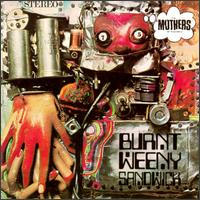 41.
Frank Zappa: Burnt Weeny Sandwich
(1970). Dubious choice, eh? Hardly. This is not an easy listen (then again,
what Zappa album is? Sheik Yerbouti?), but the reason I put it on
here is that it is a very honourable and reperesentative, if not the best,
specimen of 'classical-rock' fusion in the true sense, i.e. when the two
genres are really melted together and not just juxtaposed. It is also one
of the best examples of why Frank was actually a creative, daring and truly
serious composer - not just a weirdo.
41.
Frank Zappa: Burnt Weeny Sandwich
(1970). Dubious choice, eh? Hardly. This is not an easy listen (then again,
what Zappa album is? Sheik Yerbouti?), but the reason I put it on
here is that it is a very honourable and reperesentative, if not the best,
specimen of 'classical-rock' fusion in the true sense, i.e. when the two
genres are really melted together and not just juxtaposed. It is also one
of the best examples of why Frank was actually a creative, daring and truly
serious composer - not just a weirdo.
If you like this album check out everything else Frank and the Mothers put out at the time - including Uncle Meat, Hot Rats and maybe - for a more difficult listen - Weasels Ripped My Flesh. Frank went into a more gimmicky, if not any less intriguing, direction afterwards; but some of these albums gotta rank among art-rock's greatest achievements, even if it takes time to appreciate them.
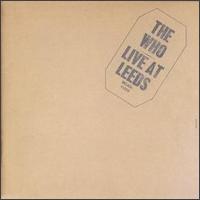 42.
The Who: Live At Leeds (1970). I've
only met a few people who didn't worship the album, and not a single person
who didn't like it. 'Greatest live album ever'? May well be. In any case,
the Who's live performance is the closest it comes at capturing the perfect
live spirit of rock'n'roll while at the same time maintaining a steady
and professional atmosphere, peppering everything with great original hooks,
and displaying a brilliant level of improvisation that's energetic and
creative. Few live albums live up to these standards.
42.
The Who: Live At Leeds (1970). I've
only met a few people who didn't worship the album, and not a single person
who didn't like it. 'Greatest live album ever'? May well be. In any case,
the Who's live performance is the closest it comes at capturing the perfect
live spirit of rock'n'roll while at the same time maintaining a steady
and professional atmosphere, peppering everything with great original hooks,
and displaying a brilliant level of improvisation that's energetic and
creative. Few live albums live up to these standards.
If you like this album do get its companion - Live At The Isle Of Wight, presenting the Who in a different setting (large outdoor venue). The sound is somewhat different, but in no way inferior, in fact, I still can't decide which of the two albums I like the better. And hey, if you have the possibility, trace down all the Who live bootlegs from the epoch. Please!
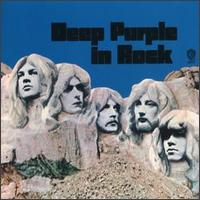 43.
Deep Purple: Deep Purple In Rock (1970).
Heavy metal's second-greatest defining moment. The Purplers were great
in that they completely dismissed the 'evil' side of the newly-born genre,
concentrating on the 'having fun' side - which is not to say that the cathartic
emotional resonance is entirely forgotten, just take a listen to 'Child
In Time'. Blackmore's guitar once again redefines hard rock standards,
and more or less the same goes for Ian Gillan's vocals. Absolutely essential
listening.
43.
Deep Purple: Deep Purple In Rock (1970).
Heavy metal's second-greatest defining moment. The Purplers were great
in that they completely dismissed the 'evil' side of the newly-born genre,
concentrating on the 'having fun' side - which is not to say that the cathartic
emotional resonance is entirely forgotten, just take a listen to 'Child
In Time'. Blackmore's guitar once again redefines hard rock standards,
and more or less the same goes for Ian Gillan's vocals. Absolutely essential
listening.
If you like this album, remember that it was followed by the slightly inferior, but still ass-kickin' Fireball and the just as ass-kickin' Machine Head. The latter is actually sometimes considered to be Purple's pinnacle, but to me, In Rock still seems more consistent (not to mention groundbreaking). Nevertheless, all the three albums are classics, and any 'classic metal' fan will want to have all the three.
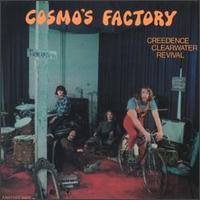 44.
Creedence Clearwater Revival: Cosmo's
Factory (1970). One thing that this band had a real knack for was finding
that perfect pop hook and utilizing it to full force within the
traditional borders of a 'generic' blues-rock number. Hence, a band that
sounded like nobody else: a band that wasn't content with playing over
the same tired formula and counting it Great as long as it could be considered
"Authentic", but added its own flavour and unmistakable pop sensibility.
There's no way avoiding the hooks on this record.
44.
Creedence Clearwater Revival: Cosmo's
Factory (1970). One thing that this band had a real knack for was finding
that perfect pop hook and utilizing it to full force within the
traditional borders of a 'generic' blues-rock number. Hence, a band that
sounded like nobody else: a band that wasn't content with playing over
the same tired formula and counting it Great as long as it could be considered
"Authentic", but added its own flavour and unmistakable pop sensibility.
There's no way avoiding the hooks on this record.
If you like this album, remember that all Creedence albums bar one are well worth owning, and it's a real joy to explore their modest, but thoroughly consistent catalog. John Fogerty's solo career is also well worth investigating. As for their successors... amazing as it might seem, CCR didn't have even a single well-known band follow their steps. Not to my knowledge, at least.
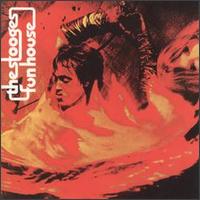 45.
The Stooges: Funhouse (1970). This
one's not for the feeble-minded. The ultimate band that couldn't play,
write or sing... not. They could do all these things - they just
didn't do them in the traditionally accepted way, and Funhouse is
the perfect demonstration. Loud, violent, it is the epitome of proto-punk's
'caveman sound', and yet, it's exceedingly artsy in its own nihilistic
manner. Rock has seen tons of angry and violent albums, but none as brutal,
psychic aggressive - and tasteful - as this one.
45.
The Stooges: Funhouse (1970). This
one's not for the feeble-minded. The ultimate band that couldn't play,
write or sing... not. They could do all these things - they just
didn't do them in the traditionally accepted way, and Funhouse is
the perfect demonstration. Loud, violent, it is the epitome of proto-punk's
'caveman sound', and yet, it's exceedingly artsy in its own nihilistic
manner. Rock has seen tons of angry and violent albums, but none as brutal,
psychic aggressive - and tasteful - as this one.
If you like this album, you'd probably want to check out the Stooges' other two albums - they're also great, but far milder. I am not an expert on late Sixties proto punk myself, though. The MC5 are supposed to be somewhat similar. However, don't even start messing around with Iggy Pop's solo career if you look for a continuation of the Stooges vibe.
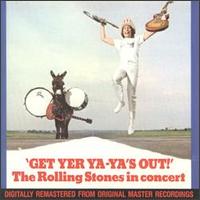 46.
The Rolling Stones: Get Yer Ya-Ya's Out!
(1970). The second best live album of its era - and maybe of all time.
The Stones play their brand of rock'n'roll different from the Who, but
what's wrong with that? Updating Chuck Berry for the late Sixties (both
literally and figuratively), they develop the kind of moderate, yet enthralling,
driving sound that's professional enough to earn respect from technique-loving
people and wild enough to be able to headbang to it. As perfect a 'golden
middle' as could ever be desired.
46.
The Rolling Stones: Get Yer Ya-Ya's Out!
(1970). The second best live album of its era - and maybe of all time.
The Stones play their brand of rock'n'roll different from the Who, but
what's wrong with that? Updating Chuck Berry for the late Sixties (both
literally and figuratively), they develop the kind of moderate, yet enthralling,
driving sound that's professional enough to earn respect from technique-loving
people and wild enough to be able to headbang to it. As perfect a 'golden
middle' as could ever be desired.
If you like this album, there's not much else to recommend: none of the Stones other live albums live up to its standard, so unless you go around collecting bootlegs, you'll have to be content with this one. But I think that appreciation of Ya-Ya's also opens the road to appreciating all kinds of early Seventies' British blues-rock, from Free to the Faces and so on.
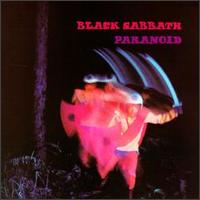 47.
Black Sabbath: Paranoid (1970).
Heavy metal's third-greatest defining moment. For some, it might actually
be the first, as Black Sabbath were even more influential on the
metal scene (particularly the Eighties) than Led Zep and Deep Purple. Well,
it depends on how much you like Eighties metal, after all. But independent
of that, Paranoid is one great album that's overflowing with catchy,
original metal anthems, and it even has some ballads - and the ballads
work! Heavily (no pun intended) recommended to everybody.
47.
Black Sabbath: Paranoid (1970).
Heavy metal's third-greatest defining moment. For some, it might actually
be the first, as Black Sabbath were even more influential on the
metal scene (particularly the Eighties) than Led Zep and Deep Purple. Well,
it depends on how much you like Eighties metal, after all. But independent
of that, Paranoid is one great album that's overflowing with catchy,
original metal anthems, and it even has some ballads - and the ballads
work! Heavily (no pun intended) recommended to everybody.
If you like this album, check out its surroundings: Black Sabbath is less consistent, but even more groundbreaking, while Master Of Reality doesn't have the same high points, but is often called 'the heaviest album ever recorded' - in 1971!! Also keep in mind that the early Seventies' metal scene was definitely not limited to Black Sabbath - but I'm no expert.
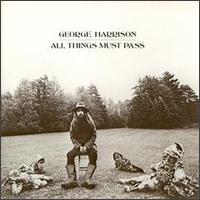 48.
George Harrison: All Things Must Pass
(1970). If not for the stupid 'Apple Jam' that constitutes one third of
this triple LP set, this would - hands down - be the greatest album released
by an ex-Beatle. George Harrison's deep spiritual feelings and great backlog
of excellent tunes + Phil Spector's trademark 'wall-of-sound production'
= easily the most grandiose, bombastic AND completely adequate expression
of religious devotion in the entire history of rock music.
48.
George Harrison: All Things Must Pass
(1970). If not for the stupid 'Apple Jam' that constitutes one third of
this triple LP set, this would - hands down - be the greatest album released
by an ex-Beatle. George Harrison's deep spiritual feelings and great backlog
of excellent tunes + Phil Spector's trademark 'wall-of-sound production'
= easily the most grandiose, bombastic AND completely adequate expression
of religious devotion in the entire history of rock music.
If you like this album, you can explore George's career further, but be wary: he never ever amounted to the same level of sophistication, catchiness and sincerity as on here, although certain parts of Living In The Material World come close, and albums like 33 And 1/3 are fun, harmless listens. Also, don't forget his masterful 1987 comeback with Cloud 9.
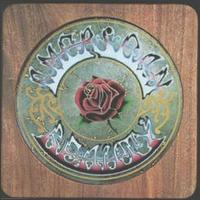 49.
The Grateful Dead: American Beauty
(1970). If you want a 'soft' roots-rock album, sentimental and intelligent,
humble enough not to be inadequate, yet deep enough to provoke some thoughts
and emotional response, and diverse enough so as not to bore you by the
second track, why not take this one? The Dead are careful not to stray
too far away from the actual 'roots', unlike the British roots-rock bands,
and don't overload their songs with too many pop tunes like CCR - but maybe
that's what you'll want...
49.
The Grateful Dead: American Beauty
(1970). If you want a 'soft' roots-rock album, sentimental and intelligent,
humble enough not to be inadequate, yet deep enough to provoke some thoughts
and emotional response, and diverse enough so as not to bore you by the
second track, why not take this one? The Dead are careful not to stray
too far away from the actual 'roots', unlike the British roots-rock bands,
and don't overload their songs with too many pop tunes like CCR - but maybe
that's what you'll want...
If you like this album, check out its companion, Workingman's Dead, but the rest of the Grateful Dead's catalog will only occasionally match your expectations, as the band was essentially psychedelic, you know. But they did establish the 'soft-rock tradition', together with CSN - and hey, it's not their fault that we had to tolerate everything the Eagles put out.
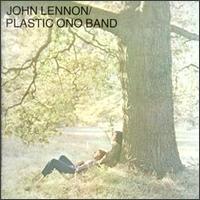 50.
John Lennon: John Lennon/Plastic Ono Band
(1970). How many times have you heard about this album being the ultimate
in minimalistic production? The ultimate in personal confessions? One of
the most pissed-off collections of tunes ever recorded, one of those records
that don't use that much to make their point but make it more effectively
than anybody else? Lennon's defining solo statement that he could only
have made after freeing himself from the Beatles' chains? Well... IT'S
ALL TRUE.
50.
John Lennon: John Lennon/Plastic Ono Band
(1970). How many times have you heard about this album being the ultimate
in minimalistic production? The ultimate in personal confessions? One of
the most pissed-off collections of tunes ever recorded, one of those records
that don't use that much to make their point but make it more effectively
than anybody else? Lennon's defining solo statement that he could only
have made after freeing himself from the Beatles' chains? Well... IT'S
ALL TRUE.
If you like this album, check out the rest of Lennon's solo career (particular highlights are Imagine (1972), Walls And Bridges (1974) and the blistering 'Lennon half' on Double Fantasy (1980)). But remember that John 'mellowed out' a bit after this album, so you might be disappointed... As for the record in question - it hardly has any analogies in rock music.
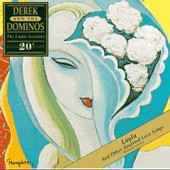 51.
Derek & The Dominos: Layla And Other
Assorted Love Songs (1970). This one's been slightly overrated through
the years, but it's still one of the best albums for those who love a good
guitar sparring match. Eric Clapton is at his peak, and Duane Allman -
of the Allman Brothers fame - inspires him just enough to deliver absolutely
mind-blowing guitarwork... and contributes some mind-blowing guitarwork
himself. Some of the most tasteful and emotionally resonant British blues-rock
ever made.
51.
Derek & The Dominos: Layla And Other
Assorted Love Songs (1970). This one's been slightly overrated through
the years, but it's still one of the best albums for those who love a good
guitar sparring match. Eric Clapton is at his peak, and Duane Allman -
of the Allman Brothers fame - inspires him just enough to deliver absolutely
mind-blowing guitarwork... and contributes some mind-blowing guitarwork
himself. Some of the most tasteful and emotionally resonant British blues-rock
ever made.
If you like this album, the only other Derek & The Dominos album, Live At The Fillmore, is an absolute must. It has no Duane Allman, but Clapton is doing his best to work for the two of them, and actually manages to obliterate some of the studio versions! It's a hard listen, long solos and all, but it's one of those few 'jam' records that don't bore me for a single second.
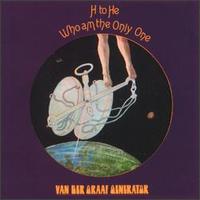 52.
Van Der Graaf Generator: H To He Who Am
The Only One (1970). Prog-rock at its most theatrical. Van der Graaf
don't value guitar sound too much, but who cares if Robert Fripp actually
takes care of the guitars on this album? Plus, the guys got a unique 'sax-organ'
groove going on for them, and they're able to find enough killer riffs
and insert enough emotional resonance to make this work. And it's hardly
possible for such an expressive guy as Peter Hammill not to make any impression
on you.
52.
Van Der Graaf Generator: H To He Who Am
The Only One (1970). Prog-rock at its most theatrical. Van der Graaf
don't value guitar sound too much, but who cares if Robert Fripp actually
takes care of the guitars on this album? Plus, the guys got a unique 'sax-organ'
groove going on for them, and they're able to find enough killer riffs
and insert enough emotional resonance to make this work. And it's hardly
possible for such an expressive guy as Peter Hammill not to make any impression
on you.
If you like this album, proceed carefully: this band never knew when to stop, and occasionally went overboard into the deep seas of pretention and tunelessness, as on the ridiculous 'epic' Pawn Hearts. My other favourites include the slightly more lightweight debut album Aerosol Grey Machine and a couple later, more introspective records like World Record and Still Life.
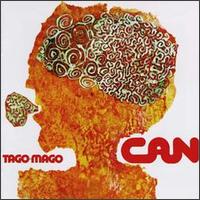 53.
Can: Tago-Mago (1971). Krautrock emerges
on the scene in full force. This double album (thankfully, it fits on one
CD) is not for everybody, but it fully displays Can's innovative and incredible
potential in exploring the dark sides of our subconscious. Apart from a
couple lengthy and not too great chaotic sound explorations, the performances
are unbelievably tight - the guys are awesome musicians, and the psychotic
blabber of Damo Suzuki has to be heard to be believed. But beware, it's
bound to creep you out.
53.
Can: Tago-Mago (1971). Krautrock emerges
on the scene in full force. This double album (thankfully, it fits on one
CD) is not for everybody, but it fully displays Can's innovative and incredible
potential in exploring the dark sides of our subconscious. Apart from a
couple lengthy and not too great chaotic sound explorations, the performances
are unbelievably tight - the guys are awesome musicians, and the psychotic
blabber of Damo Suzuki has to be heard to be believed. But beware, it's
bound to creep you out.
If you like this album, check out Can's entire classic period of 1970-74, starting with the criminally underrated Soundtracks (shorter, but even more consistent - and more accessible and immediately likeable, too), and ending with the more 'ambient-friendly' Future Days and Soon Over Babaluma, where the band moves closer to 'fantasy-world', but is just as groundbreaking.
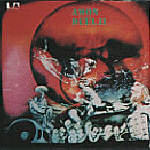 54.
Amon Düül II: Tanz Der Lemminge
(1971). Another double album by a Krautrock band that fits on one
Cd. But there the similarity ends, because Amon Düül II were
keen on building 'fantasy worlds' from the very beginning. And this is
their peak, with huge, lush, diverse and unpredictable sonic landscapes
that make you trip out without having to inhale outside substances. I'm
not too tolerable towards albums that just make you trip out, but this
is one of the better exceptions, and a must for prog-rock fans.
54.
Amon Düül II: Tanz Der Lemminge
(1971). Another double album by a Krautrock band that fits on one
Cd. But there the similarity ends, because Amon Düül II were
keen on building 'fantasy worlds' from the very beginning. And this is
their peak, with huge, lush, diverse and unpredictable sonic landscapes
that make you trip out without having to inhale outside substances. I'm
not too tolerable towards albums that just make you trip out, but this
is one of the better exceptions, and a must for prog-rock fans.
If you like this album, Amon Düül II have plenty more of that stuff! Yeti (1970) has even higer points, although I'm hugely sceptical about the 'improvised' half of it; Wolf City and Carnival In Babylon develop these themes even further (although not always to good effect, as Carnival shows); and stuff like Vive La Trance and later albums are closer to 'mainstream', but still weird enough.
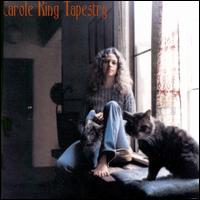 55.
Carole King: Tapestry (1971).
Even most of those who detest the Seventies soft rock movement have to
acknowledge this is a great album, and one that shows that true melodic
skills coupled with real emotional engagement can make even the cheesiest
and most generic or sissy arrangements come to life. Not that these particular
arrangements are all that cheesy, and anyway, most of the time it's just
Carole and her piano (and voice, of course) you have to pay attention to.
One of the most optimistic and heart warming albums of all time, next to
Stevie Wonder's Songs In The Key Of Life.
55.
Carole King: Tapestry (1971).
Even most of those who detest the Seventies soft rock movement have to
acknowledge this is a great album, and one that shows that true melodic
skills coupled with real emotional engagement can make even the cheesiest
and most generic or sissy arrangements come to life. Not that these particular
arrangements are all that cheesy, and anyway, most of the time it's just
Carole and her piano (and voice, of course) you have to pay attention to.
One of the most optimistic and heart warming albums of all time, next to
Stevie Wonder's Songs In The Key Of Life.
If you like this album you won't want to listen to general critical opinion that always singles out Tapestry as the only Carole King album worth owning, and will at least want to check out her earlier, and slightly more adventurous, Writer (1970), as well as some of the later albums like Music (1972) and Fantasy (1973); you yourself choose when to stop, as different people seem to have different borderlines for Carole's stuff.
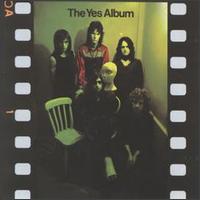 56.
Yes: The Yes Album (1971). If the Nice
founed prog-rock, and King Crimson made the first full-fledged prog-rock
music, then Yes simply took the prog-rock formula to its absolute heights
- any more and the bubble bursts, as it happened to the band three years
later. Here, however, everything works: the band has enough pop instincts
not to forget about hooks, enough professionalism to blow most competition
away, and enough modesty not to go totally overboard. Much as I'm sceptical
about Yes, this one's a winner.
56.
Yes: The Yes Album (1971). If the Nice
founed prog-rock, and King Crimson made the first full-fledged prog-rock
music, then Yes simply took the prog-rock formula to its absolute heights
- any more and the bubble bursts, as it happened to the band three years
later. Here, however, everything works: the band has enough pop instincts
not to forget about hooks, enough professionalism to blow most competition
away, and enough modesty not to go totally overboard. Much as I'm sceptical
about Yes, this one's a winner.
If you like this album, check out its follow-ups: Fragile might be less innovative and its numerous 'solo spots' might be confusing, but the songwriting quality on there is arguably even better; and Close To The Edge is often considered to be Yes' peak due to the grandiosity of the compositions, although I think it has far too few ideas to actually merit all the hype...
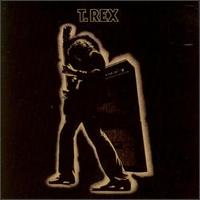 57.
T. Rex: Electric Warrior (1971).
Marc Bolan goes completely electric and firmly establishes the values of
glam-rock: flashy, loud, melodic, insanely catchy, gritty and trashy. Wait!
Screw that last word - glam-rock was trashy as long as it was formulaic,
but the glam-rock of T. Rex is far more thoughtful and tasteful than you
might imagine. For one, there's a deep and sarcastic irony underlying all
of Bolan's 'teen idol' image, and that irony, coupled with great melodies
and fun lyrics, makes up for some timeless music.
57.
T. Rex: Electric Warrior (1971).
Marc Bolan goes completely electric and firmly establishes the values of
glam-rock: flashy, loud, melodic, insanely catchy, gritty and trashy. Wait!
Screw that last word - glam-rock was trashy as long as it was formulaic,
but the glam-rock of T. Rex is far more thoughtful and tasteful than you
might imagine. For one, there's a deep and sarcastic irony underlying all
of Bolan's 'teen idol' image, and that irony, coupled with great melodies
and fun lyrics, makes up for some timeless music.
If you like this album, there's more: The Slider (1972) is considered a similar classic, although I'd prefer to disagree and establish Tanx (1973) as Bolan's absolute peak as glam-rocker. Who cares if that album wasn't as sensational - Marc's music outlived the trends. There can be some gems found in his later catalog as well, particularly on Dandy In The Underworld (1977).
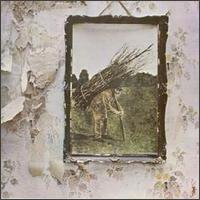 58.
Led Zeppelin: Untitled (IV) (1971).
The sine qua non of rock music. I didn't want to include it here,
but God knows it's one of the most influential records in history, and
it's full of classics, so what do I know? This is the record that started
'fantasy metal', and while it did have some worthy inheritors (Rainbow,
for instance), most of the influence has been rather negative (Uriah Heep!!).
But that doesn't prevent us from still treating 'Stairway To Heaven' and
'When The Levee Breaks' as cult favourites.
58.
Led Zeppelin: Untitled (IV) (1971).
The sine qua non of rock music. I didn't want to include it here,
but God knows it's one of the most influential records in history, and
it's full of classics, so what do I know? This is the record that started
'fantasy metal', and while it did have some worthy inheritors (Rainbow,
for instance), most of the influence has been rather negative (Uriah Heep!!).
But that doesn't prevent us from still treating 'Stairway To Heaven' and
'When The Levee Breaks' as cult favourites.
If you like this album, feel free to dig deeper into the catalog of the Zepsters. Me, I'm not a great fan of late Led Zep, but that doesn't mean that nobody else is. But please please please, don't go in for derivative primitive trash like Uriah Heep. Too much schoolboy mysticism is simply incompatible with good taste, and I do mean it in an objective way of thinking.
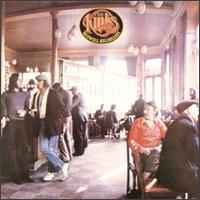 59.
The Kinks: Muswell Hillbillies (1971).
Country-western was never like that! And never will be. The Kinks' last
epochal album is in no way similar to anything they ever did before. This
is a bunch of rootsy tunes, for sure (waltz, bebop, blues, doo-wop, country-rock,
whatever), but done with a special humouristic British twist, and the combination
works brilliantly. Not only is this one of the greatest comedy records
of all time, it also possesses insanely catchy melodies and Ray Davies'
sensitive atmosphere. Classic.
59.
The Kinks: Muswell Hillbillies (1971).
Country-western was never like that! And never will be. The Kinks' last
epochal album is in no way similar to anything they ever did before. This
is a bunch of rootsy tunes, for sure (waltz, bebop, blues, doo-wop, country-rock,
whatever), but done with a special humouristic British twist, and the combination
works brilliantly. Not only is this one of the greatest comedy records
of all time, it also possesses insanely catchy melodies and Ray Davies'
sensitive atmosphere. Classic.
If you like this album, you can check out its 'sequel', Everybody's In Show-Biz, which is pretty good as far as sequels go, but not more than that. The album has simply no analogies anywhere in rock music, and is perhaps the most 'weird' representative of the entire roots-rock genre you'll ever find. Note, though, that it's practically 'undissectable' - the components don't work independently.
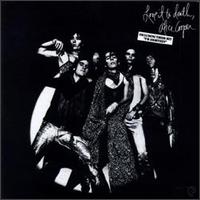 60.
Alice Cooper: Love It To Death (1971).
Teenage angst at its most blatant, stupid and stubborn. Not my favourite
album of all time, but even I gotta admit - the original Alice Cooper band
captured that 'youngster frustration' element like nobody else, actually
improving upon the social rebellion trends of the Rolling Stones and the
Who; those two bands did it better, but very quickly moved on to 'artsier'
things, while the Cooper band took this 'rebellion' as one of their main
mottos (together with shock rock, but that's a different story).
60.
Alice Cooper: Love It To Death (1971).
Teenage angst at its most blatant, stupid and stubborn. Not my favourite
album of all time, but even I gotta admit - the original Alice Cooper band
captured that 'youngster frustration' element like nobody else, actually
improving upon the social rebellion trends of the Rolling Stones and the
Who; those two bands did it better, but very quickly moved on to 'artsier'
things, while the Cooper band took this 'rebellion' as one of their main
mottos (together with shock rock, but that's a different story).
If you like this album, check out Killer as well - it has more shock rock, but it's still just as immaculate anyway. Later on, Alice Cooper slowly started drifting away from teenage angst into all-out 'black vaudeville' of guillotines and boas, but the first few albums are well worth checking out even if you detest shock rock as a genre. The punks do own a lot to Alice Cooper, of course.
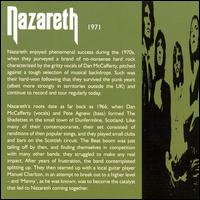 61.
Nazareth: Nazareth (1971). These
guys were extremely consistent throughout the Seventies, not amounting
to anything higher than a very respectable heavy metal band and not falling
to anything lower than that - but it's the band's debut album that shows
something truly unique, a wonderful blend of Black Sabbath with their Scottish
'mountaineer' attitudes, a heavy, yet amazingly romantic and authentic
tone, a kind of 'Celtic folk meets metal' vibe that puts Led Zeppelin to
shame. Underrated, but vital to any collection.
61.
Nazareth: Nazareth (1971). These
guys were extremely consistent throughout the Seventies, not amounting
to anything higher than a very respectable heavy metal band and not falling
to anything lower than that - but it's the band's debut album that shows
something truly unique, a wonderful blend of Black Sabbath with their Scottish
'mountaineer' attitudes, a heavy, yet amazingly romantic and authentic
tone, a kind of 'Celtic folk meets metal' vibe that puts Led Zeppelin to
shame. Underrated, but vital to any collection.
If you like this album, you'll probably be disappointed in later Nazareth: Exercises is similar, but far softer, and most of the band's consequent output is just normal heavy metal, with good riffs and vocals and everything, but way too dependent on their immediate metal influences. Sadly, this vibe has never since been recaptured - not to my knowledge, at least.
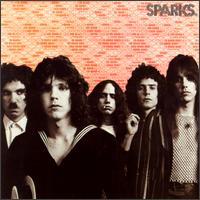 62.
Sparks: Sparks (1971). A veritable
incunabula, this album is almost impossible to find, but it just so happens
that it's one of the "best records that's impossible to find"
ever. Ron and Russell Mael set out to produce an intelligent and experimental
pop album, and end up virtually predicting the entire New Wave scene, not
to mention all of the operatic flourishes of Queen. If you wanted catchy,
yet twisted and thought-provoking, melodies, funny lyrics and a never ending
intrigue, look no further. The greatest underrated debut of all time.
62.
Sparks: Sparks (1971). A veritable
incunabula, this album is almost impossible to find, but it just so happens
that it's one of the "best records that's impossible to find"
ever. Ron and Russell Mael set out to produce an intelligent and experimental
pop album, and end up virtually predicting the entire New Wave scene, not
to mention all of the operatic flourishes of Queen. If you wanted catchy,
yet twisted and thought-provoking, melodies, funny lyrics and a never ending
intrigue, look no further. The greatest underrated debut of all time.
If you like this album (and you're bound to like it, so it would be more correct to say "if you find this album"), then rejoice, as Sparks have more of this stuff ready for you. Beware, though, because in the mid-Seventies Sparks hit the disco vibe and never quite recovered - much of their later music may be good, but it's nowhere near those innovative and entertaining heights of the 1971-76 period.
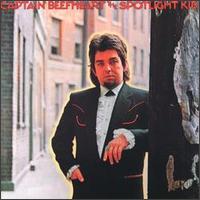 63.
Captain Beefheart: The Spotlight Kid
(1972). Beefheart's take on the blues (and deep down inside, Beefheart
is nothing but a gritty old bluesman - much as he wants to conceal it sometimes)
is one of the most bizarre and eccentric things in - and over - the limits
of rock music, and this album is probably the best representative of his
style. Take a basic structure, twist it, make it creepy and paranoid, add
weird imaginative lyrics, and you got yourself a masterful mystification
with a saving touch of humour.
63.
Captain Beefheart: The Spotlight Kid
(1972). Beefheart's take on the blues (and deep down inside, Beefheart
is nothing but a gritty old bluesman - much as he wants to conceal it sometimes)
is one of the most bizarre and eccentric things in - and over - the limits
of rock music, and this album is probably the best representative of his
style. Take a basic structure, twist it, make it creepy and paranoid, add
weird imaginative lyrics, and you got yourself a masterful mystification
with a saving touch of humour.
If you like this album, feel free to dig deeper. Notice that I haven't put up the more obvious choice - the critically acclaimed 1969 album Trout Mask Replica, because it's a) far more difficult to get into and b) frankly, I still often wonder if it's worth the bother. For me, it's still way too anti-musical and unfunny. However, records like 1979's Shiny Beast are quite enjoyable.
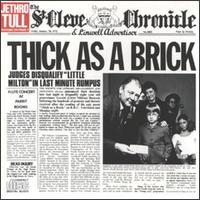 64.
Jethro Tull: Thick As A Brick (1972).
Maybe it's not the ideal prog rock record, but it's certainly the ideal
one-song prog record: one track strewn over two sides and featuring more
creative musical and lyrical ideas than many bands can actually come up
with in all of their career. A unique blend of rock, jazz, blues, Elizabethan
music, avantgarde noises, nursery rhymes, pop balladry and God knows what
else, all joined together with intelligent "social pathos" of
the lyrics, the album's impact has never been matched since.
64.
Jethro Tull: Thick As A Brick (1972).
Maybe it's not the ideal prog rock record, but it's certainly the ideal
one-song prog record: one track strewn over two sides and featuring more
creative musical and lyrical ideas than many bands can actually come up
with in all of their career. A unique blend of rock, jazz, blues, Elizabethan
music, avantgarde noises, nursery rhymes, pop balladry and God knows what
else, all joined together with intelligent "social pathos" of
the lyrics, the album's impact has never been matched since.
If you like this album, the rest of Jethro Tull's career is well worth checking out; Stand Up (1969) and Aqualung (1971) are equally timeless classics that didn't make the list only because of a lesser degree of originality. That said, later period Tull is very spotty, to say the least: even this record's immediate successor, A Passion Play (also a one-song album) is far less creative and/or interesting.
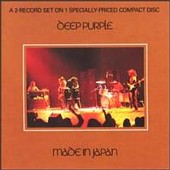 65.
Deep Purple: Made In Japan (1972).
Hands down the grittiest and most exciting heavy metal live album ever
recorded. There've been better performances, there's been better sound
quality, maybe there's even been more consistent material - but for freshness
and vigour of approach, experimental passages, pure youthful energy and
inspiration, nothing even comes close. Ian Gillan screams his head off,
Ritchie Blackmore pulls all the stops, Jon Lord plays the meanest organ
possible... simply a must for any hard rock lover.
65.
Deep Purple: Made In Japan (1972).
Hands down the grittiest and most exciting heavy metal live album ever
recorded. There've been better performances, there's been better sound
quality, maybe there's even been more consistent material - but for freshness
and vigour of approach, experimental passages, pure youthful energy and
inspiration, nothing even comes close. Ian Gillan screams his head off,
Ritchie Blackmore pulls all the stops, Jon Lord plays the meanest organ
possible... simply a must for any hard rock lover.
If you like this album, don't even bother about later period Purple live records - not a single one is worth mentioning in this context. As far as early heavy metal live albums go, though, I've always thought that Zep's Song Remains The Same was underrated (although the BBC Sessions are even better), and, well, Thin Lizzy's Live And Dangerous ain't too bad either...
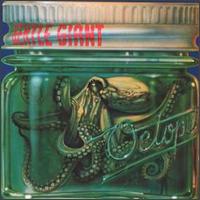 66.
Gentle Giant: Octopus (1972). Ever
wondered about the most complex prog rock album ever released? This one
may easily take the stand, but an honourable stand, that is, complex album
that owes its complexity not as much to meaningless meandering and dissonance
as to clever and wisely crafted melody shifts and quirky tone changes and
bizarre instrumentation. Not my favourite record from this band, but arguably
its most idiosyncratic, original and innovative; worth it for the gorgeous
'Advent Of Panurge' alone.
66.
Gentle Giant: Octopus (1972). Ever
wondered about the most complex prog rock album ever released? This one
may easily take the stand, but an honourable stand, that is, complex album
that owes its complexity not as much to meaningless meandering and dissonance
as to clever and wisely crafted melody shifts and quirky tone changes and
bizarre instrumentation. Not my favourite record from this band, but arguably
its most idiosyncratic, original and innovative; worth it for the gorgeous
'Advent Of Panurge' alone.
If you like this album, welcome to the flowering cult of Gentle Giant. My personal favourites are the band's two first albums (Gentle Giant, 1970, and Acquiring The Taste, 1971), where the guys weren't so detached yet, painting far more impressive sonic landscapes. But this earliest period also betrays too much Yes and King Crimson influence, which is why I had to downplay these records a bit.
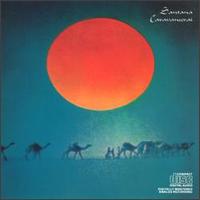 67.
Santana: Caravanserai (1972).
Not the most obvious pick for Carlos and his bunch of Latin-playing sidemen,
but I'm primarily picking this out because it illustrates both the band
and Carlos at their relative peaks: the band plays as tightly and
self-assuredly as on any preceding records, while Carlos really unfurls
his talents as a blazing guitar technician and a deeply spiritual artist.
The record can take some getting used to, but eventually it has all the
chances of becoming your personal favourite in the 'emotional' department.
67.
Santana: Caravanserai (1972).
Not the most obvious pick for Carlos and his bunch of Latin-playing sidemen,
but I'm primarily picking this out because it illustrates both the band
and Carlos at their relative peaks: the band plays as tightly and
self-assuredly as on any preceding records, while Carlos really unfurls
his talents as a blazing guitar technician and a deeply spiritual artist.
The record can take some getting used to, but eventually it has all the
chances of becoming your personal favourite in the 'emotional' department.
If you like this album, Santana's got a lot more. If you prefer more accessible, but more generic, Latin-pop with a lot of verve, Santana's "debut trilogy" (Santana, Abraxas, Santana III) is a must for you. The "spiritual" period, starting with Caravanserai, lasted for about three years more, but Carlos never came close to the heavenly heights of Caravanserai. Lotus is a good live summary of all this.
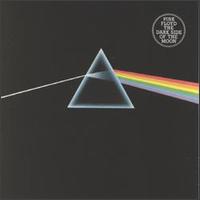 68.
Pink Floyd: Dark Side Of The Moon (1973).
You probably never heard of this one - an album even more underground than
the Sparks' debut, a timeless lost classic... Okay, dropping the joke,
I must say it's not my favourite Pink Floyd album, but there's no denying
that as far as successful bridges between elaborate art-rock and mass culture
goes, Dark Side makes its mark fairly well. It's one of the darkest
albums ever made all right, but its true greatness is in that it made this
darkness accessible to general audiences.
68.
Pink Floyd: Dark Side Of The Moon (1973).
You probably never heard of this one - an album even more underground than
the Sparks' debut, a timeless lost classic... Okay, dropping the joke,
I must say it's not my favourite Pink Floyd album, but there's no denying
that as far as successful bridges between elaborate art-rock and mass culture
goes, Dark Side makes its mark fairly well. It's one of the darkest
albums ever made all right, but its true greatness is in that it made this
darkness accessible to general audiences.
If you like this album, you're probably one of those wusses who only know of Pink Floyd's mid-/late-Seventies monster hit albums... then again, maybe not. In any case, Wish You Were Here and The Wall are generally more of the same, with similar messages and moods, but my favourite of this period is the unjustly overlooked Animals, with Waters' most original lyrical concept.
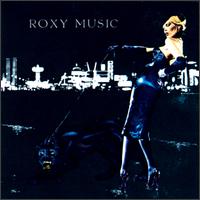 69.
Roxy Music: For Your Pleasure (1973).
Dark, dark and decadent, with the lustful and sensuous grin of Bryan Ferry
making a perfect counterpoint for the twisted proto-gothic/futuristic arrangements
of Sound Wiz Brian Eno... and at the same time, ironically following the
title, also a great album for dancing to, on tracks like 'Do The Strand'
and 'Editions Of You'. This record can be seen as art, prog, glam, goth,
even "industrial" in places... if you ever wondered about who
was the most dangerous band of 1973, look no further.
69.
Roxy Music: For Your Pleasure (1973).
Dark, dark and decadent, with the lustful and sensuous grin of Bryan Ferry
making a perfect counterpoint for the twisted proto-gothic/futuristic arrangements
of Sound Wiz Brian Eno... and at the same time, ironically following the
title, also a great album for dancing to, on tracks like 'Do The Strand'
and 'Editions Of You'. This record can be seen as art, prog, glam, goth,
even "industrial" in places... if you ever wondered about who
was the most dangerous band of 1973, look no further.
If you like this album, mind you that basically every Roxy Music album in between 1972 and 1975 is a must for any collection. For more Eno wizardry and futurism, check out the self-titled debut; for more of Bryan Ferry's lush melancholic approach, check out Stranded and Country Life; and for a solid junction of "artsy" and "disco", see Siren.
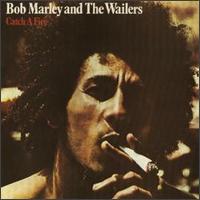 70.
Bob Marley & The Wailers: Catch A
Fire (1973). Reggae is not the easiest genre to assimilate, mainly
because "it all sounds the same". This album is the perfect antithesis,
then: no two songs here actually sound alike, as far as moods and vocal
melodies go, at least. Perhaps it doesn't showcase all the sides of reggae:
it was recorded before Marley got his 'prophetic' status, and has few of
those anthemic statements of his. But it's the guy's most personal and
intimate statement, and the best Tosh/Marley collaboration out there.
70.
Bob Marley & The Wailers: Catch A
Fire (1973). Reggae is not the easiest genre to assimilate, mainly
because "it all sounds the same". This album is the perfect antithesis,
then: no two songs here actually sound alike, as far as moods and vocal
melodies go, at least. Perhaps it doesn't showcase all the sides of reggae:
it was recorded before Marley got his 'prophetic' status, and has few of
those anthemic statements of his. But it's the guy's most personal and
intimate statement, and the best Tosh/Marley collaboration out there.
If you like this album, Marley's got more! Burnin' is essentially more of the same style; later albums get a wee bit less 'intimate', but stuff like Natty Dread is almost as well written and will please you with its stately anthemic declarations, while latter-day Marley, particularly on Exodus, will strike you as a giant of the Grand Spiritual Statement. This music just gotta be appreciated.
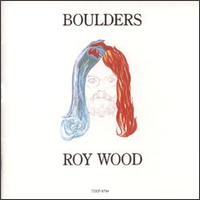 71.
Roy Wood: Boulders (1973). Can
we get around without a Move or Roy Wood album on this page? Definitely
not. Out of all of their candies, this one hits the big time because it's
one of the most perfect records ever recorded by one man singlehandedly
(sure beats out Prince and Todd Rundgren) and its diversity is staggeringly
impressive. The master of hook and melody, Wood plays all the instruments,
records all the voices, adds some weirdness and lets you have more fun
than you'd experience over the entire Rush catalog.
71.
Roy Wood: Boulders (1973). Can
we get around without a Move or Roy Wood album on this page? Definitely
not. Out of all of their candies, this one hits the big time because it's
one of the most perfect records ever recorded by one man singlehandedly
(sure beats out Prince and Todd Rundgren) and its diversity is staggeringly
impressive. The master of hook and melody, Wood plays all the instruments,
records all the voices, adds some weirdness and lets you have more fun
than you'd experience over the entire Rush catalog.
If you like this album, check out everything you can find that has 'Roy Wood' on it, except for his last 1987 solo album, which sucks. The Move are pefect for glittering pop singles and weird artistic exercises; Wizzard are harder to take, but they still have a unique sound going for them; and Wood's other solo albums, like Mustard, are filled with little underrated pop gems.
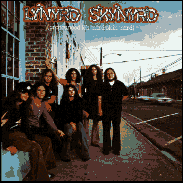 72.
Lynyrd Skynyrd: Pronounced Leh-Nerd
Skin-Nerd (1973). You may hate this record and despise it, but you
should own it, if only to know and understand what exactly
you're spitting at. This is vintage, quintessential Southern Rock; everything
about it is reperesented on here, with all the barroom flavour intact and
even perfected. Guilty pleasure or not, the songs on here are well-written,
catchy and melodic, and even if it is cheesy, 'Freebird' will still
be one of the genre's main anthems, want it or not.
72.
Lynyrd Skynyrd: Pronounced Leh-Nerd
Skin-Nerd (1973). You may hate this record and despise it, but you
should own it, if only to know and understand what exactly
you're spitting at. This is vintage, quintessential Southern Rock; everything
about it is reperesented on here, with all the barroom flavour intact and
even perfected. Guilty pleasure or not, the songs on here are well-written,
catchy and melodic, and even if it is cheesy, 'Freebird' will still
be one of the genre's main anthems, want it or not.
If you like this album (why not?), you can continue engaging in further Skynyrd records, although personally, I think they never topped this one. Then there's this whole brew of Southern Rock bands which I'm not really an expert on, like Little Feat (the band that's most respected by non-Southern rock aficionados), or Blackfoot, or, well, a million others. Skynyrd is the epitome, though.
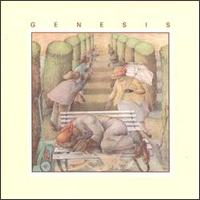 73.
Genesis: Selling England By The Pound
(1973). Musically, Genesis weren't particularly innovative; but it was
the combination of their complex progressive melodies, slightly surrealistic
(but actually meaningful and intelligent, unlike, say, those of Yes) lyrics
and a certain spiritual philosophy that makes me, for instance, declare
them as my favourite prog-rock band of all time. The utter Britishness
of this album, which combines medieval motives with witty actual
social references, simply can't be beat.
73.
Genesis: Selling England By The Pound
(1973). Musically, Genesis weren't particularly innovative; but it was
the combination of their complex progressive melodies, slightly surrealistic
(but actually meaningful and intelligent, unlike, say, those of Yes) lyrics
and a certain spiritual philosophy that makes me, for instance, declare
them as my favourite prog-rock band of all time. The utter Britishness
of this album, which combines medieval motives with witty actual
social references, simply can't be beat.
If you like this album, just about everything from Genesis' Peter Gabriel period will qualify; for instance, I almost thought of putting Foxtrot onto this very same list, but then I realized that the two records are too similar in the overall style (kinda like a Beggar's Banquet and a Let It Bleed - while the differences between those two are significant, they still fall in one general category).
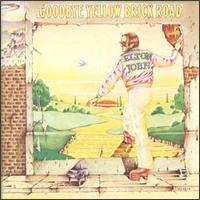 74.
Elton John: Goodbye Yellow Brick Road
(1973). Trashy glam-pop, yeah, but so what? This is a massive, epochal
record, and in a way, it symbolizes all that was great and all that was
wrong with flashy mainstream mid-Seventies piano-pop better than anything
else. (Come on, you wouldn't want me to put up a Billy Joel record here,
now would you?). Yes, there are several nasty lapses of taste on here,
but for the most part, Elton keeps it entertaining throughout, and his
songwriting is really on a roll.
74.
Elton John: Goodbye Yellow Brick Road
(1973). Trashy glam-pop, yeah, but so what? This is a massive, epochal
record, and in a way, it symbolizes all that was great and all that was
wrong with flashy mainstream mid-Seventies piano-pop better than anything
else. (Come on, you wouldn't want me to put up a Billy Joel record here,
now would you?). Yes, there are several nasty lapses of taste on here,
but for the most part, Elton keeps it entertaining throughout, and his
songwriting is really on a roll.
If you like this album, just about everything Elton released in between 1970 and 1975, with maybe one or two minor exceptions, will do. After all, you do need a mainstream piano-pop album in your collection, and this is as good a deal as you can get, although personally, I think that Elton was a bit more creative and inspired on albums like Honky Chateau or Madman Across The Water.
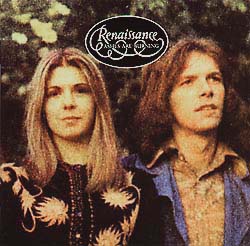 75.
Renaissance: Ashes Are Burning
(1973). A page like this can't do without a nice little Renaissance album.
This isn't even rock music - "classically-influenced folk-pop"
is more like it - but it's one of the most beautiful and innocently sweet
records produced 'in the name of rock', if you get my drift. For some reason,
nobody besides Renaissance ever came close to creating 'angelic' music
like this, and for that they remain one of the most underrated progressive
bands ever. Get this record at all costs - it's cathartic.
75.
Renaissance: Ashes Are Burning
(1973). A page like this can't do without a nice little Renaissance album.
This isn't even rock music - "classically-influenced folk-pop"
is more like it - but it's one of the most beautiful and innocently sweet
records produced 'in the name of rock', if you get my drift. For some reason,
nobody besides Renaissance ever came close to creating 'angelic' music
like this, and for that they remain one of the most underrated progressive
bands ever. Get this record at all costs - it's cathartic.
If you like this album, more Renaissance is recommended - particularly from the "peak" period of 1972-1975, with Prologue, Turn Of The Cards and even the slightly over-bombastic Scheherazade all qualifying. In the process, don't forget about Renaissance Mark I with Jane Relf on vocals, and their 'offspring' band, Illusion, who also made similar classically-influenced music.
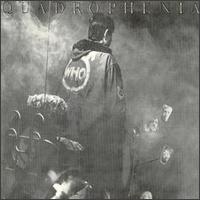 76.
The Who: Quadrophenia (1973).
Perhaps the most defining, brutally honest and at the same time meticulously
elaborated album that art-rock has seen, this is an absolute masterpiece
and Pete Townshend's high peak as an "artist", if not necessarily
as a "hookmaster". This album works on so many levels it's stunning
- nostalgic (the whole Mods/rockers story), teenage angst (Jimmy's story),
cathartic ('Love Reign O'er Me'), technical (immaculate production and
playing)... DSOTM can kiss my ass.
76.
The Who: Quadrophenia (1973).
Perhaps the most defining, brutally honest and at the same time meticulously
elaborated album that art-rock has seen, this is an absolute masterpiece
and Pete Townshend's high peak as an "artist", if not necessarily
as a "hookmaster". This album works on so many levels it's stunning
- nostalgic (the whole Mods/rockers story), teenage angst (Jimmy's story),
cathartic ('Love Reign O'er Me'), technical (immaculate production and
playing)... DSOTM can kiss my ass.
If you like this album, check out Who's Next, of course. Yes, some will complain that I haven't included Who's Next in the list, but my humble opinion is that, as great as that record is, Quadrophenia offers us everything Next has and much more; plus, as far as conceptual albums go, Quadrophenia is far more balanced and adequate than the Lifehouse project ever was.
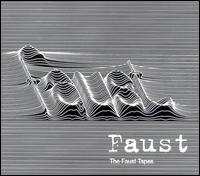 77.
Faust: The Faust Tapes (1973). You
may not like industrial music, but you have to know what industrial music
is all about. And Faust are ready to tell you this! A forty-plus minute
collage that alternates gorgeous melodies with unimaginable chaotic sonic
battles, this stuff might seem nonsensic, but really, it's all about life
- isn't our life an alternation between white-noise industrial bummers
and gorgeous melodies? An excellent compromise between melody and dissonance,
and an intriguing listen nearly all the way through.
77.
Faust: The Faust Tapes (1973). You
may not like industrial music, but you have to know what industrial music
is all about. And Faust are ready to tell you this! A forty-plus minute
collage that alternates gorgeous melodies with unimaginable chaotic sonic
battles, this stuff might seem nonsensic, but really, it's all about life
- isn't our life an alternation between white-noise industrial bummers
and gorgeous melodies? An excellent compromise between melody and dissonance,
and an intriguing listen nearly all the way through.
If you like this album, check out the rest of Faust's catalog - it's not at all huge! Their debut album I don't quite like (too much emphasis on collages), but So Far is an innovative and inventive 'weird pop' masterpiece, whereas Faust IV is a huge step towards merging pop and industrial with ambient textures, and making the final product eatable for even some of the more untrained ears.
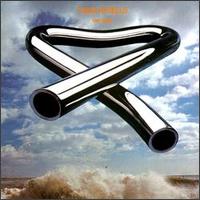 78.
Mike Oldfield: Tubular Bells (1973).
Art-rock again, this time in its "one-man band" guise: Oldfield
composes and performs all of this ambitious, imaginative suite completely
by himself, making a brilliant listening experience and also setting the
stage for the "New Age revolution" to come - with the album's
'static' approach to music as a set of repetitive atmosphere-creating loops.
Not that this really sounds a lot like New Age, not at all; it's way
too loud and bombastic to be true New Age.
78.
Mike Oldfield: Tubular Bells (1973).
Art-rock again, this time in its "one-man band" guise: Oldfield
composes and performs all of this ambitious, imaginative suite completely
by himself, making a brilliant listening experience and also setting the
stage for the "New Age revolution" to come - with the album's
'static' approach to music as a set of repetitive atmosphere-creating loops.
Not that this really sounds a lot like New Age, not at all; it's way
too loud and bombastic to be true New Age.
If you like this album, you can invest in its "sequels", and no, I don't mean Tubular Bells II or III, recorded much later; I mean Hergest Ridge and Ommadawn, which constitute the real natural "proto-New Age" trilogy of Mike. Not that they manage to surpass the first part, but they'll be able to satisfy the hunger of those who hunt for more vintage Oldfield.
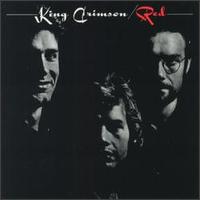 79.
King Crimson: Red (1974). One of the
most influential albums of the Seventies - arguably, the whole 'heavy'
department of the alt rock scene can be traced back to this stuff, from
grunge to industrial to whatever. But its value is not limited to its influence:
Red is one of the most imaginative and intelligent hard rock albums
ever recorded, adding symphonic sound and deep expressivity that bands
like Uriah Heep or Rush could only dream about. The ideal hybrid of hard
and art, IMHO.
79.
King Crimson: Red (1974). One of the
most influential albums of the Seventies - arguably, the whole 'heavy'
department of the alt rock scene can be traced back to this stuff, from
grunge to industrial to whatever. But its value is not limited to its influence:
Red is one of the most imaginative and intelligent hard rock albums
ever recorded, adding symphonic sound and deep expressivity that bands
like Uriah Heep or Rush could only dream about. The ideal hybrid of hard
and art, IMHO.
If you like this album, check out the entire 1973-75 period of KC, most notably this album's studio predecessor, Larks' Tongues In Aspic, which is just as good (on certain days, even better). Since there were never any bands that sounded like the untouchable King Crimson, I won't be recommending anything else. That's all.
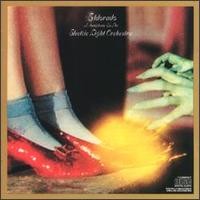 80.
Electric Light Orchestra: Eldorado
(1974). Nowadays, ELO's legacy has been completely ruined by their series
of disco hits of the late Seventies/early Eighties. But in the mid-Seventies
(you just have to choose the timing carefully: I suggest 1973-77!), ELO
were one of the prime 'serious pop' bands of their epoch, with Jeff Lynne
churning out catchy, unforgettable tunes like pancakes, and performing
one of the most perfect rock/classical synthesis grooves ever. Buy this
album, and realize how wronged you were.
80.
Electric Light Orchestra: Eldorado
(1974). Nowadays, ELO's legacy has been completely ruined by their series
of disco hits of the late Seventies/early Eighties. But in the mid-Seventies
(you just have to choose the timing carefully: I suggest 1973-77!), ELO
were one of the prime 'serious pop' bands of their epoch, with Jeff Lynne
churning out catchy, unforgettable tunes like pancakes, and performing
one of the most perfect rock/classical synthesis grooves ever. Buy this
album, and realize how wronged you were.
If you like this album, the entire highlighted ELO period is fine. On The Third Day and Face The Music are slightly less consistent, but essentially in the same vein; A New World Record ditches a lot of the 'artsiness' in favour of an even more mainstream, but equally captivating sound; and Out Of The Blue is a double album of the same - for better or for worse.
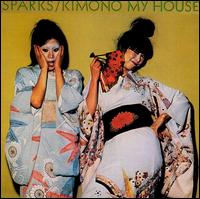 81.
Sparks: Kimono My House (1974). Too
much Sparks on this page? Well, if the band's debut album is one of the
greatest 'prophetic' albums of all time, presaging numerous genres to come,
then Kimono is simply the greatest Dance-Pop album ever put out
by anybody, period. Most of the tracks are danceable, which only serves
to show that combining dance rhythms with inventive melodies, intelligent
(sneering) lyrics and creative weirdness is not such an impossible thing
as it might seem to some.
81.
Sparks: Kimono My House (1974). Too
much Sparks on this page? Well, if the band's debut album is one of the
greatest 'prophetic' albums of all time, presaging numerous genres to come,
then Kimono is simply the greatest Dance-Pop album ever put out
by anybody, period. Most of the tracks are danceable, which only serves
to show that combining dance rhythms with inventive melodies, intelligent
(sneering) lyrics and creative weirdness is not such an impossible thing
as it might seem to some.
If you like this album, its immediate follow-up, Propaganda, is almost as good (and some actually think it better because it's not as glossy and inhumanely immaculate). Big Beat and Indiscreet, both from that epoch, also qualify as excellent listening experiences - at times, I think that Ron Mael had more unbelievable hooks in his head than the entire dance-pop scene that came afterwards.
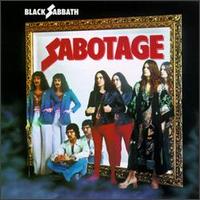 82.
Black Sabbath: Sabotage (1975).
This record is often underrated, but let's be just. Black Sabbath were
already starting to lose their edge at the time, but with this album, they
made a last desperate attempt to push forward the boundaries of heavy metal
- and amazingly, they succeeded. As much as I'm not really a fan of 'prog
metal', this is a record quintessential to the genre, with its complex,
yet exciting, song structures; and songs like 'Symptom Of The Universe'
predict thrash metal as well.
82.
Black Sabbath: Sabotage (1975).
This record is often underrated, but let's be just. Black Sabbath were
already starting to lose their edge at the time, but with this album, they
made a last desperate attempt to push forward the boundaries of heavy metal
- and amazingly, they succeeded. As much as I'm not really a fan of 'prog
metal', this is a record quintessential to the genre, with its complex,
yet exciting, song structures; and songs like 'Symptom Of The Universe'
predict thrash metal as well.
If you like this album, there's hardly anything else like that to recommend in the Sabbath catalog - and remember that 'prog metal' is a very dangerous genre, with bands often losing control and following their cheap fantasies rather than sticking to solid musical essence. Perhaps Rush could make a good song or two in that department; Uriah Heep certainly couldn't. Be wary.
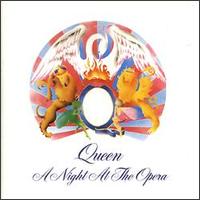 83.
Queen: A Night At The Opera (1975).
This album usually provokes a love-or-hate reaction, but it's hard not
to acknowledge its excellency as the prime "opera-rock" album
of all time: loud, bombastic, swaggering, pretentious, and either beautiful
or unbelievably cheap and trashy, whichever you like. I, personally, think
of it as both: the album has no true artistic meaning or message, just
a lot of pomp and everything, but it's one of those rare cases when the
form is so perfect it can be enjoyed despite the lack of substance.
83.
Queen: A Night At The Opera (1975).
This album usually provokes a love-or-hate reaction, but it's hard not
to acknowledge its excellency as the prime "opera-rock" album
of all time: loud, bombastic, swaggering, pretentious, and either beautiful
or unbelievably cheap and trashy, whichever you like. I, personally, think
of it as both: the album has no true artistic meaning or message, just
a lot of pomp and everything, but it's one of those rare cases when the
form is so perfect it can be enjoyed despite the lack of substance.
If you like this album, the entire 1974-76 period of Queen is equally recommendable (particularly this record's immediate 'companion', A Day At The Races). The descent into arena-rock lowness on News Of The World seems rather painful to me, but later on, Queen would revisit the same fun motives in Jazz (1978), easily their most balanced album of all.
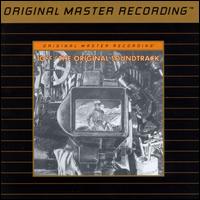 84.
10CC: The Original Soundtrack
(1975). I don't even know how to find a name for the genre institutionalized
by 10cc. "Mock-pop", perhaps? A genre that owns as much to the
Association as it owns to Frank Zappa? But Original Soundtrack,
the band's finest hour, goes even beyond that, and delves into the little
exploited areas of opera-rock ('Une Nuit A Paris') and atmospheric synth-pop
('I'm Not In Love'), while preserving the band's immaculate humoristic
touch. A truly unique and rewarding listen.
84.
10CC: The Original Soundtrack
(1975). I don't even know how to find a name for the genre institutionalized
by 10cc. "Mock-pop", perhaps? A genre that owns as much to the
Association as it owns to Frank Zappa? But Original Soundtrack,
the band's finest hour, goes even beyond that, and delves into the little
exploited areas of opera-rock ('Une Nuit A Paris') and atmospheric synth-pop
('I'm Not In Love'), while preserving the band's immaculate humoristic
touch. A truly unique and rewarding listen.
If you like this album, be sure to check out the rest of the band's "classic 4" - 10CC (1973), Sheet Music (1974) and How Dare You (1976). They never made much of an impact in the States, apart from a couple hit singles, but that's more of an argument in favour of the band than against it, if we remember it was the epoch of the Carpenters and Kiss.
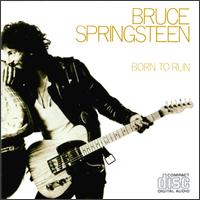 85.
Bruce Springsteen: Born To Run (1975).
Surprised, are ye? After I'd been so vicious to this album in my review,
I now put it up in this 'Hall of Fame'. Well, let's all be objective -
this IS the ultimate Seventies working class/teenage angst anthem, a glorious
romantic statement of freedom and escapism, and much as I detest Springsteen's
musical philosophy (of this period, at least), I can't deny the sheer power
and conviction of his delivery. You may hate it, too, but you should own
it anyway.
85.
Bruce Springsteen: Born To Run (1975).
Surprised, are ye? After I'd been so vicious to this album in my review,
I now put it up in this 'Hall of Fame'. Well, let's all be objective -
this IS the ultimate Seventies working class/teenage angst anthem, a glorious
romantic statement of freedom and escapism, and much as I detest Springsteen's
musical philosophy (of this period, at least), I can't deny the sheer power
and conviction of his delivery. You may hate it, too, but you should own
it anyway.
If you like this album, Bruce is da man! I must confess that my personal favourites in his catalog are the musically superior E Street Shuffle (1973) and the bleaker, more desperate Darkness On The Edge Of Town (1978) - granted, these records are nowhere near as headspinningly powerful as BTR, but they run deeper and are far more rewarding in the long run.
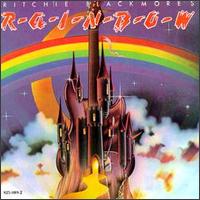 86.
Rainbow: Ritchie Blackmore's Rainbow
(1975). Fantasy metal is generally a miserable genre that produced pyramidloads
of tasteless, unlistenable albums. But when your fantasy metal album has
got Ritchie Blackmore to write some irresistable riffs and Ronnie James
Dio to sing some of the most powerful metal vocal melodies, I guess we
can be forgiving. The quintessential Seventies' heavy metal album, it shows
that there's nothing wrong with fantasy themes if they are clad in solid,
professional arrangements.
86.
Rainbow: Ritchie Blackmore's Rainbow
(1975). Fantasy metal is generally a miserable genre that produced pyramidloads
of tasteless, unlistenable albums. But when your fantasy metal album has
got Ritchie Blackmore to write some irresistable riffs and Ronnie James
Dio to sing some of the most powerful metal vocal melodies, I guess we
can be forgiving. The quintessential Seventies' heavy metal album, it shows
that there's nothing wrong with fantasy themes if they are clad in solid,
professional arrangements.
If you like this album, be sure to check out Rainbow's classic live releases (most notably In Germany), where Blackmore's talents are on fullest display. Of the other Dio-epoch Rainbow albums, I'd recommend 1978's Long Live Rock'n'Roll; 1976's Rainbow Rising is also supposed to be a classic, but I find it somewhat lacking in the songwriting department.
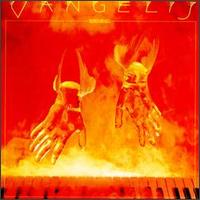 87.
Vangelis: Heaven And Hell (1975).
Whoever thinks Electronica as a genre is a product of the Nineties, or
has reached its 'peak' in the Nineties, should get things straight - this
guy recorded most of his best, groundbreaking, most imaginative electronic
works in the Seventies. Heaven And Hell is the album that I find
to be Vangelis' peak, or at least, one of the peaks - the pictures this
Greek dude paints with his synthesizers can indeed be seen as musical equivalents
of Hieronymus Bosch.
87.
Vangelis: Heaven And Hell (1975).
Whoever thinks Electronica as a genre is a product of the Nineties, or
has reached its 'peak' in the Nineties, should get things straight - this
guy recorded most of his best, groundbreaking, most imaginative electronic
works in the Seventies. Heaven And Hell is the album that I find
to be Vangelis' peak, or at least, one of the peaks - the pictures this
Greek dude paints with his synthesizers can indeed be seen as musical equivalents
of Hieronymus Bosch.
If you like this album, pretty much everything that Vangelis recorded has at least some redeeming qualities. Some albums are more boring than others but that's a matter of taste and/or deeper analysis than the one offered here. Keep in mind, too, that Vangelis was not the only one to experiment on the "melodic Electronica" scene of the Seventies; but I'm not an expert on that one.
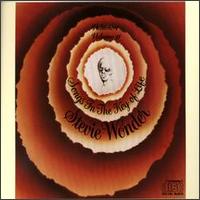 88.
Stevie Wonder: Songs In The Key Of Life
(1976). The only "R'n'B album" to own if you only own one, but
actually, it goes far, far beyond your average R'n'B - on its spreading,
massive two LPs Stevie Wonder paints an immaculate, hardly-matched pop
masterpiece that should forever stand as by far the most optimistic and
hopeful album of the century. Maybe not as innovative as some of Stevie's
earlier records, but it assembles together and shapes into a gigantic monument
all of Stevie's assets.
88.
Stevie Wonder: Songs In The Key Of Life
(1976). The only "R'n'B album" to own if you only own one, but
actually, it goes far, far beyond your average R'n'B - on its spreading,
massive two LPs Stevie Wonder paints an immaculate, hardly-matched pop
masterpiece that should forever stand as by far the most optimistic and
hopeful album of the century. Maybe not as innovative as some of Stevie's
earlier records, but it assembles together and shapes into a gigantic monument
all of Stevie's assets.
If you like this album, the entire 'classic' period of Stevie Wonder is recommendable. In my opinion, the massiveness of SITKOL can easily be matched by a clever combination of Talking Book (1972; Stevie's 'softer', more sentimental side) and Innervisions (1973; Stevie's 'harder', more socially conscious side), but that's far from all that this guy has to offer to you.
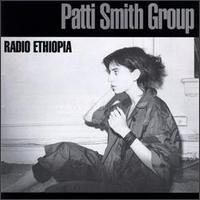 89.
Patti Smith: Radio Ethiopia (1976).
1975's Horses was certainly more 'revolutionary', but it's also
an album that holds up a little worse than its follow-up, and overall,
the critics have overhyped Horses so badly that it is now constantly
forming an alergy even among the most level-headed listeners. Radio
Ethiopia is a little bit more song-based, and gives you a full possibility
to appreciate Patti's talents as an inflaming performer - no deep meaning,
just thrill and excitement, and total conviction.
89.
Patti Smith: Radio Ethiopia (1976).
1975's Horses was certainly more 'revolutionary', but it's also
an album that holds up a little worse than its follow-up, and overall,
the critics have overhyped Horses so badly that it is now constantly
forming an alergy even among the most level-headed listeners. Radio
Ethiopia is a little bit more song-based, and gives you a full possibility
to appreciate Patti's talents as an inflaming performer - no deep meaning,
just thrill and excitement, and total conviction.
If you like this album, you will maybe be more forgiving about Patti Smith than you're supposed to be. After all, she's an extremely important link in the "proto punk chain", and all of her 'classic period' albums are well worth getting acquainted with, including also Easter (1978) and Wave (1979). The "comeback" period albums are an acquired taste, but some actually prefer them over the early stuff.
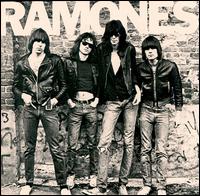 90.
The Ramones: Ramones (1976). The
punk revolution certainly begins here. But ironically, the Ramones weren't
really punks in spirit - just a bunch of potheads who decided that the
Beach Boys and the Beatles could have sounded way better if played at breakneck
speed and over chainsaw riffs. This decision led to a unique brand of minimalist
rock that's been never equalled since; "barebones rock'n'roll"
finds its true definition here. Not an album to get angry to - it's an
album to dance to, but WHAT an album!
90.
The Ramones: Ramones (1976). The
punk revolution certainly begins here. But ironically, the Ramones weren't
really punks in spirit - just a bunch of potheads who decided that the
Beach Boys and the Beatles could have sounded way better if played at breakneck
speed and over chainsaw riffs. This decision led to a unique brand of minimalist
rock that's been never equalled since; "barebones rock'n'roll"
finds its true definition here. Not an album to get angry to - it's an
album to dance to, but WHAT an album!
If you like this album, there's three more like these (the "classic quadrilogy"): Leave Home (1977) is basically more of the same with improved production (not that it's necessarily a plus), Rocket To Russia (1977) gets a bit dull to me, but Road To Ruin (1978) is a brilliant combination of the original approach with more refined pop hooks and ballads and gets some great applause as well.